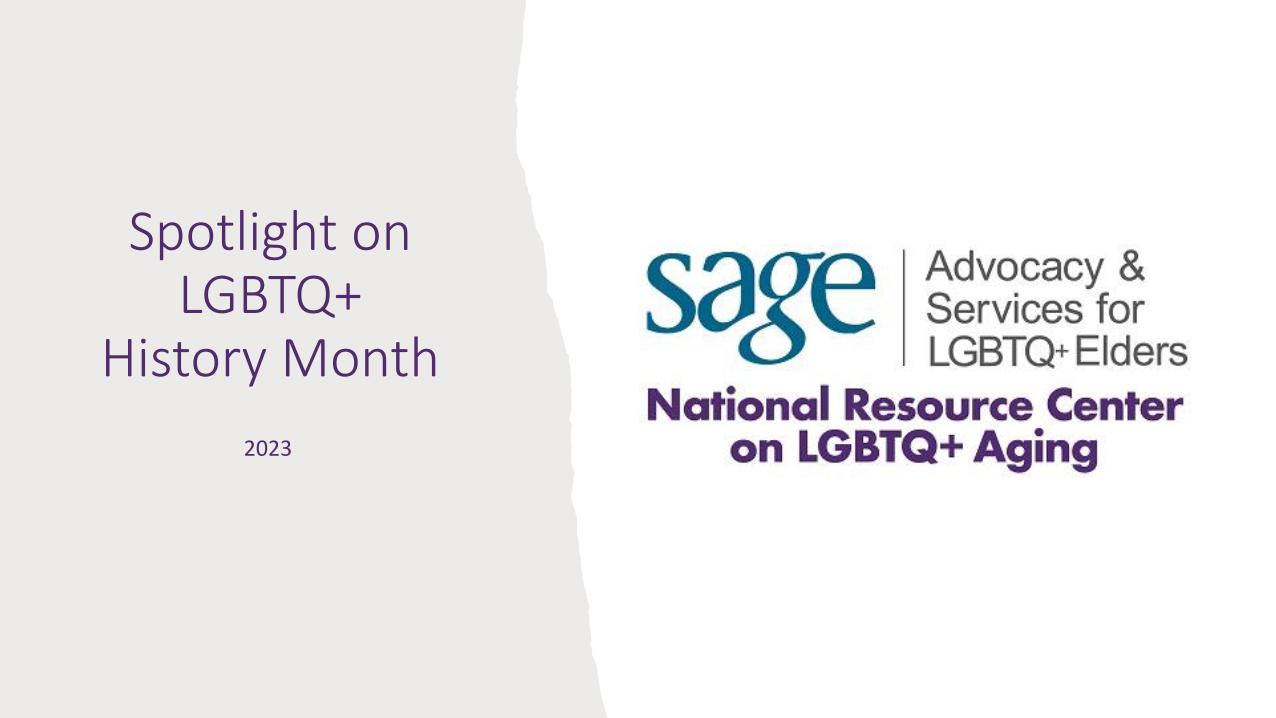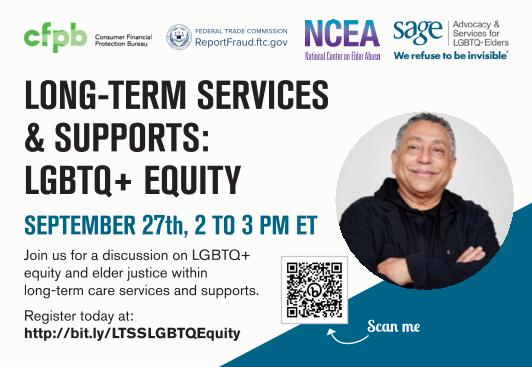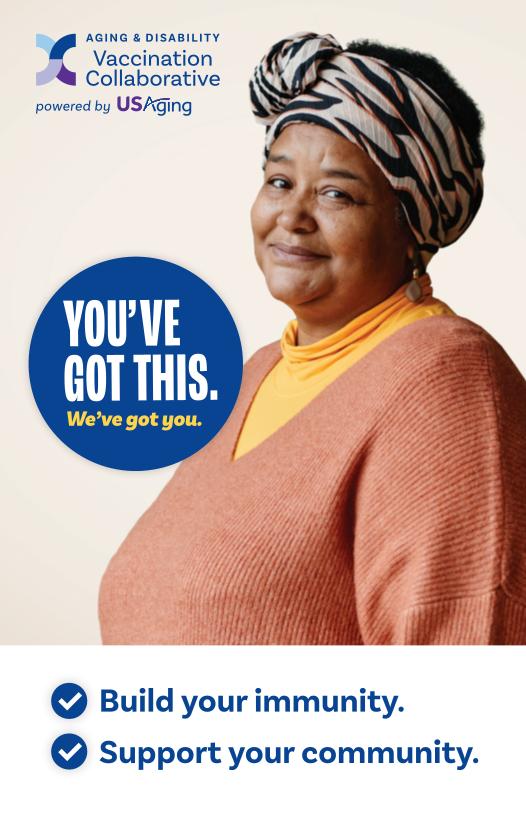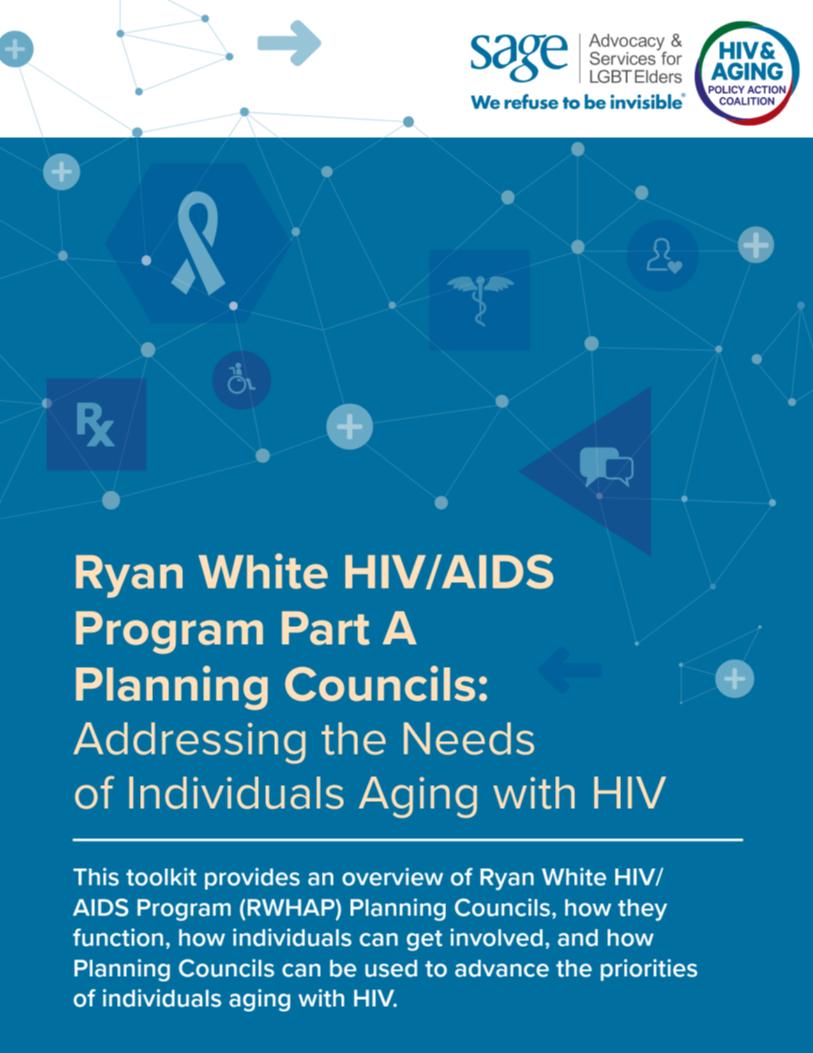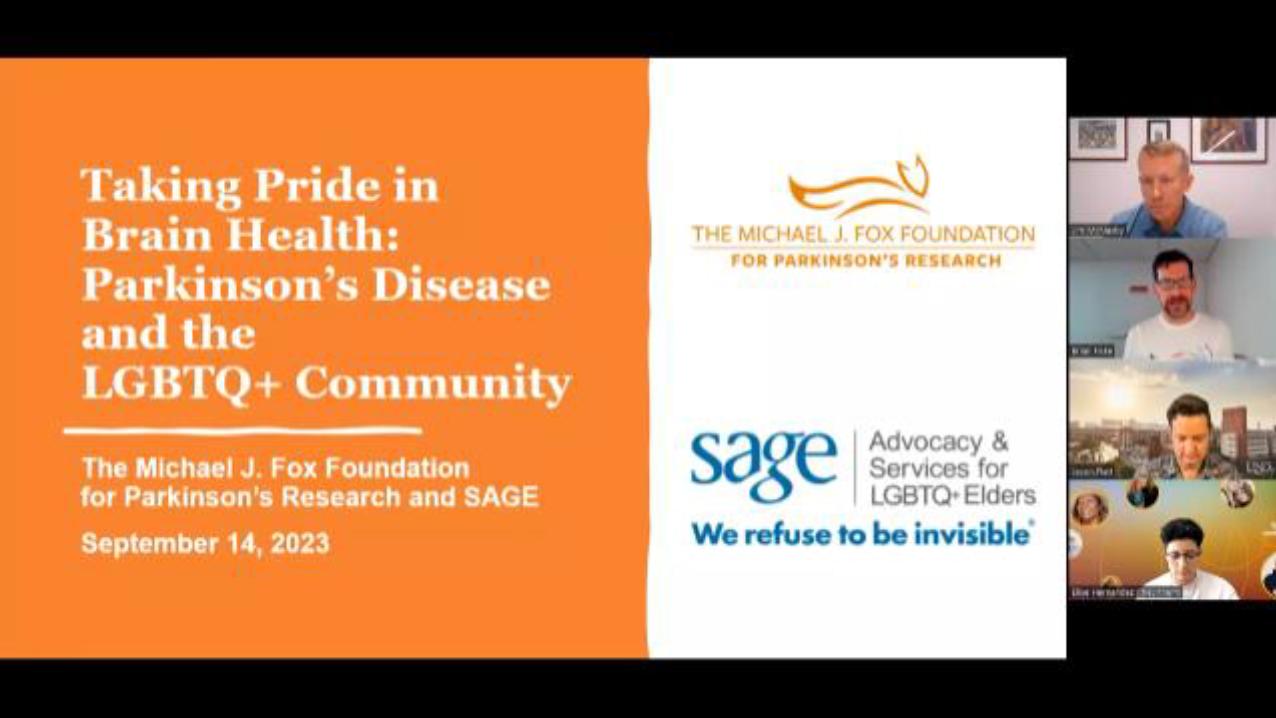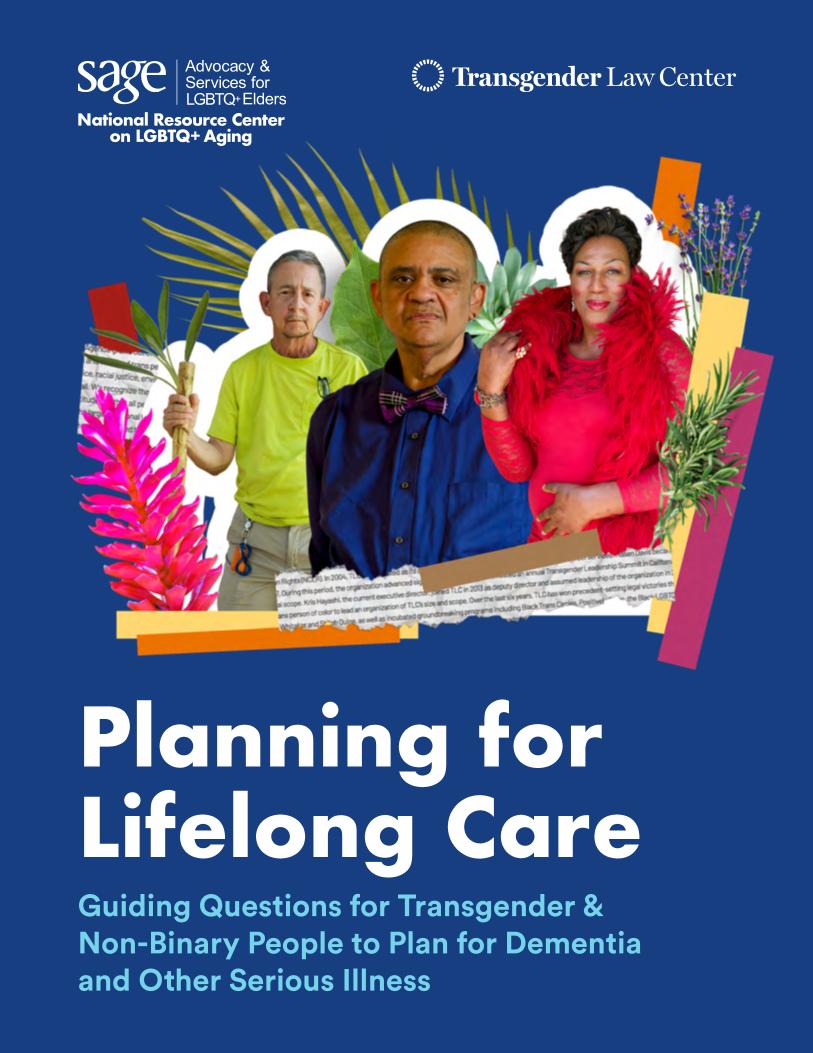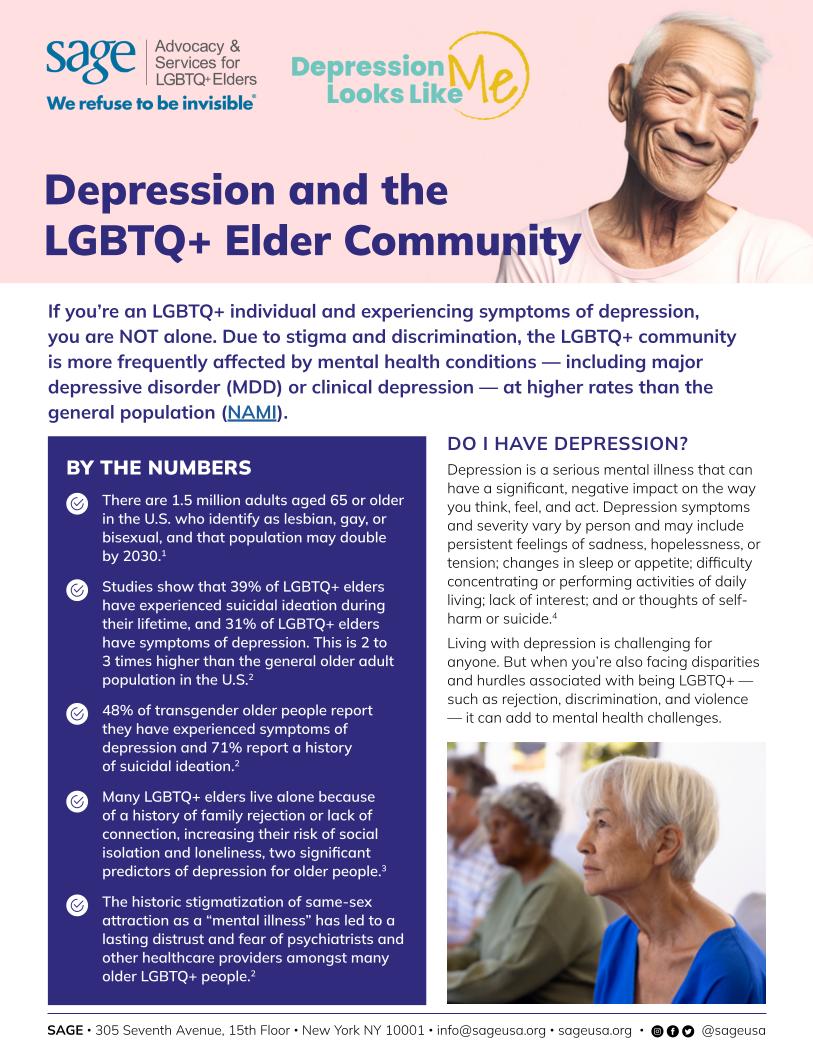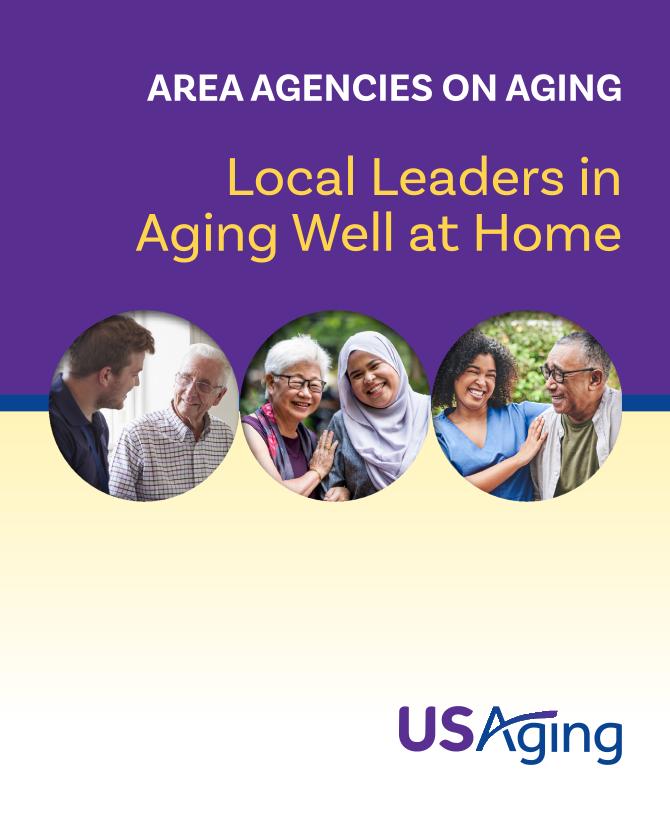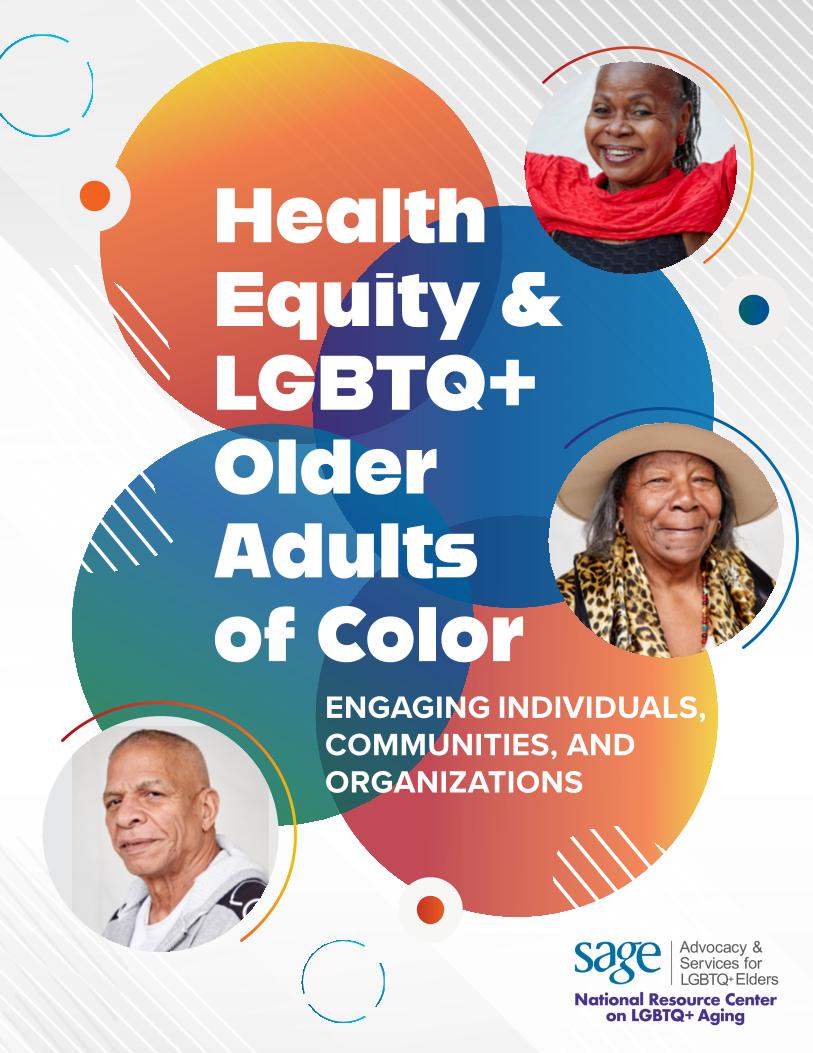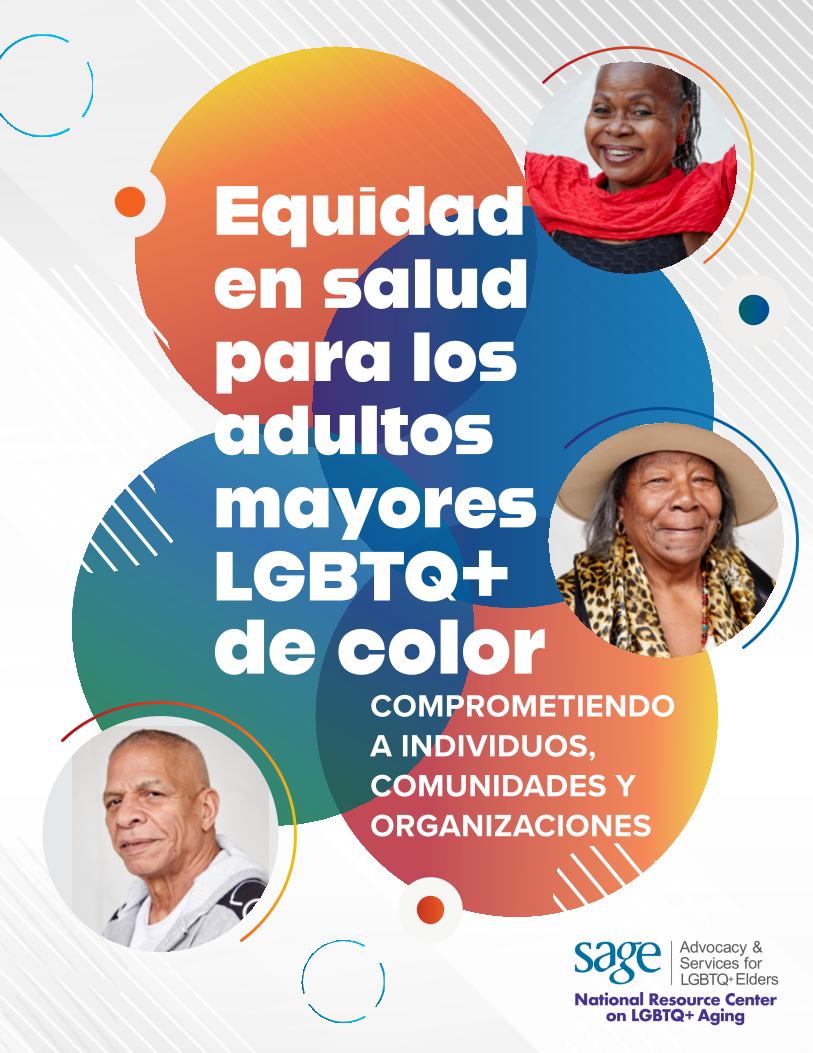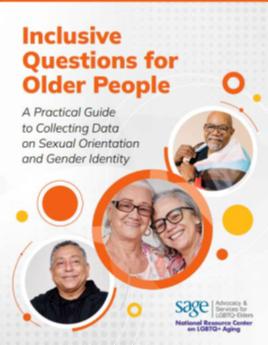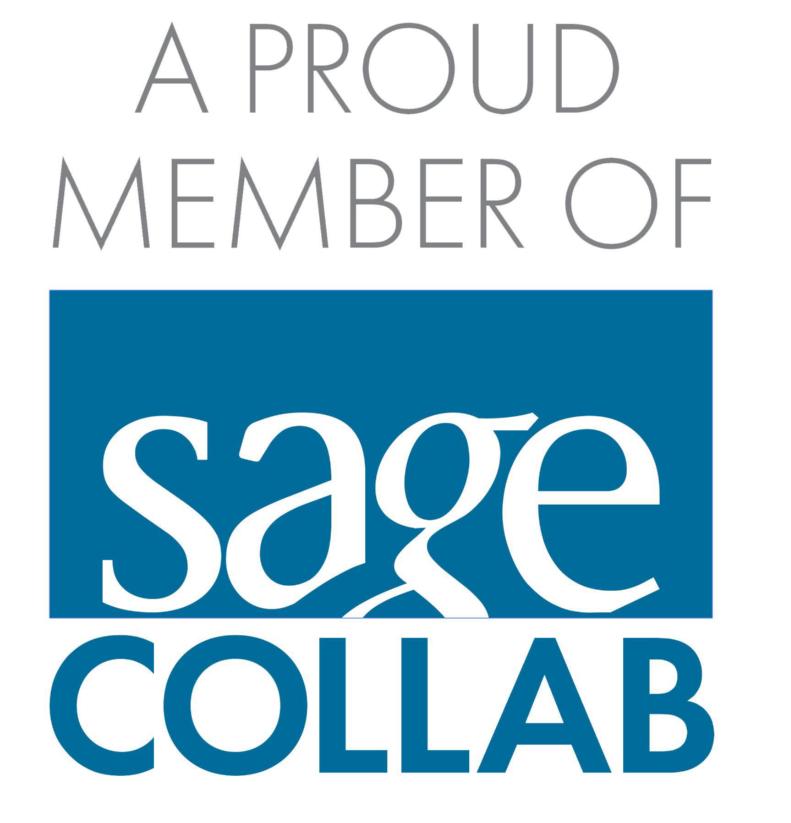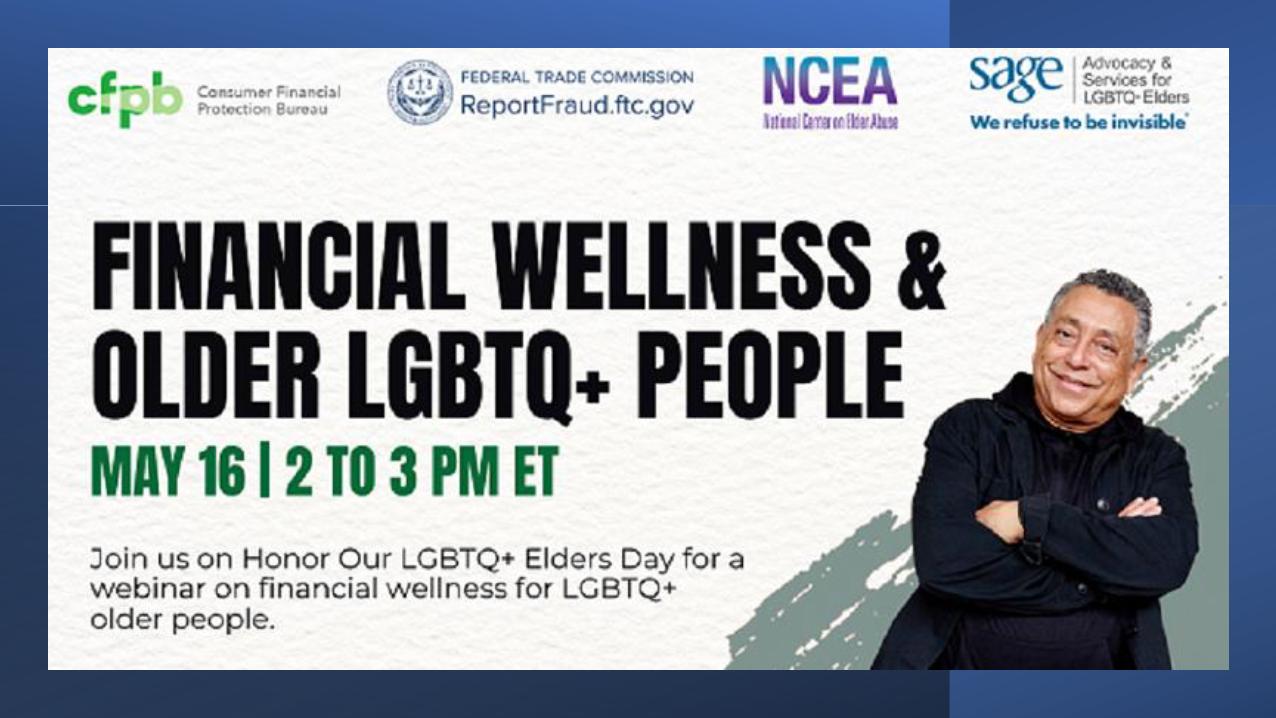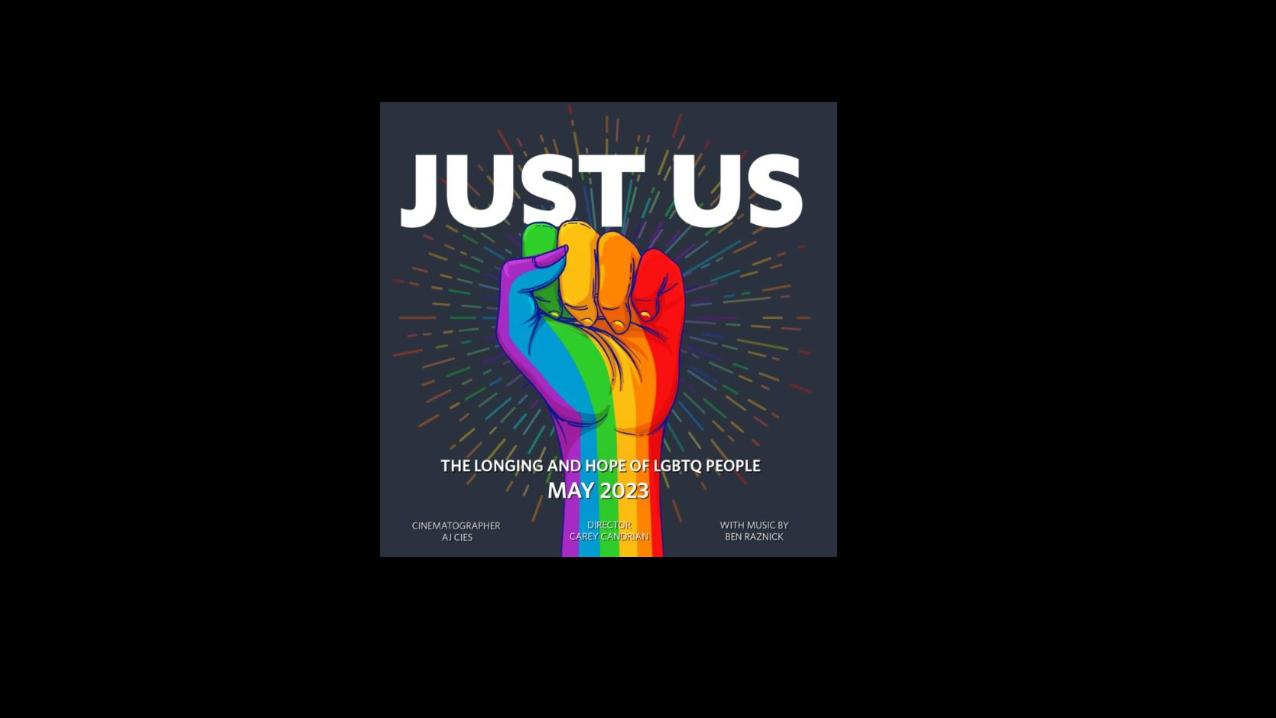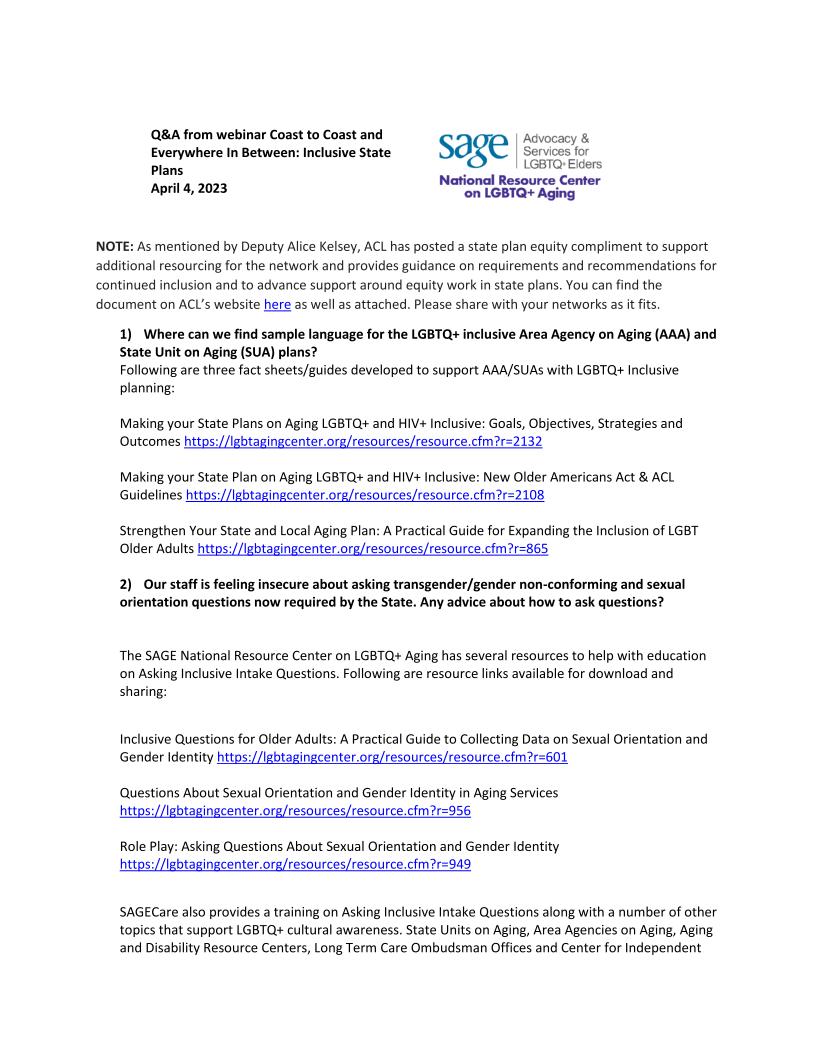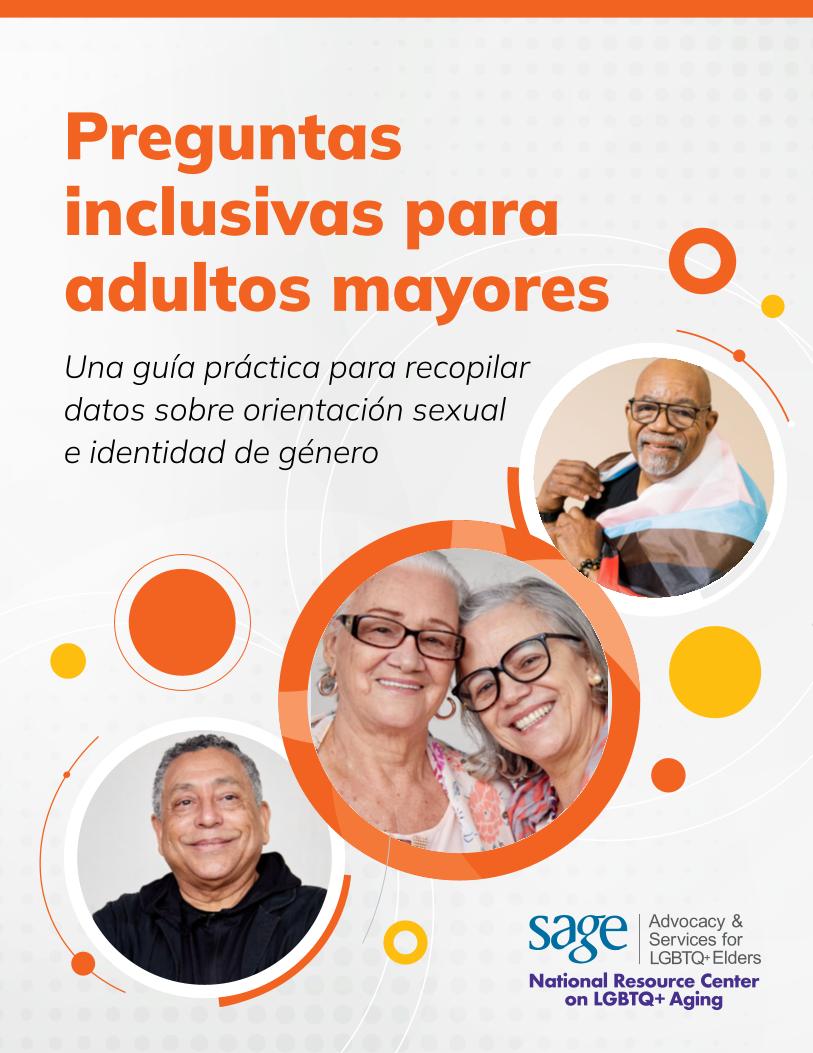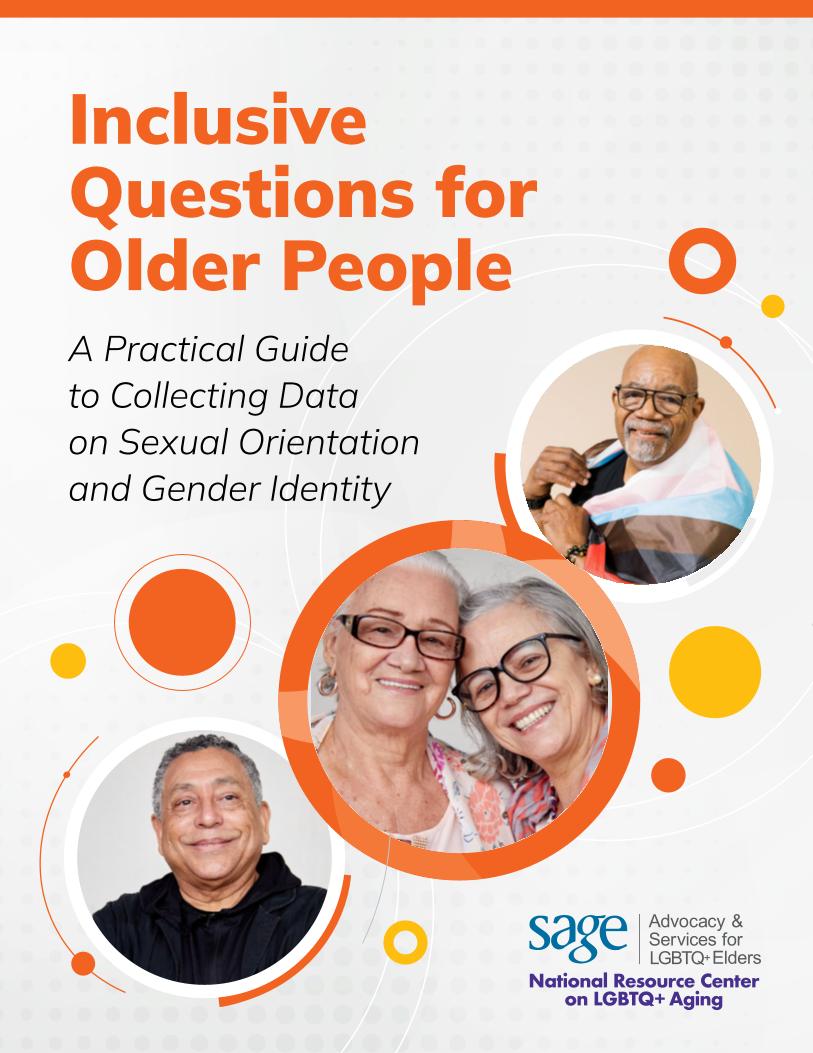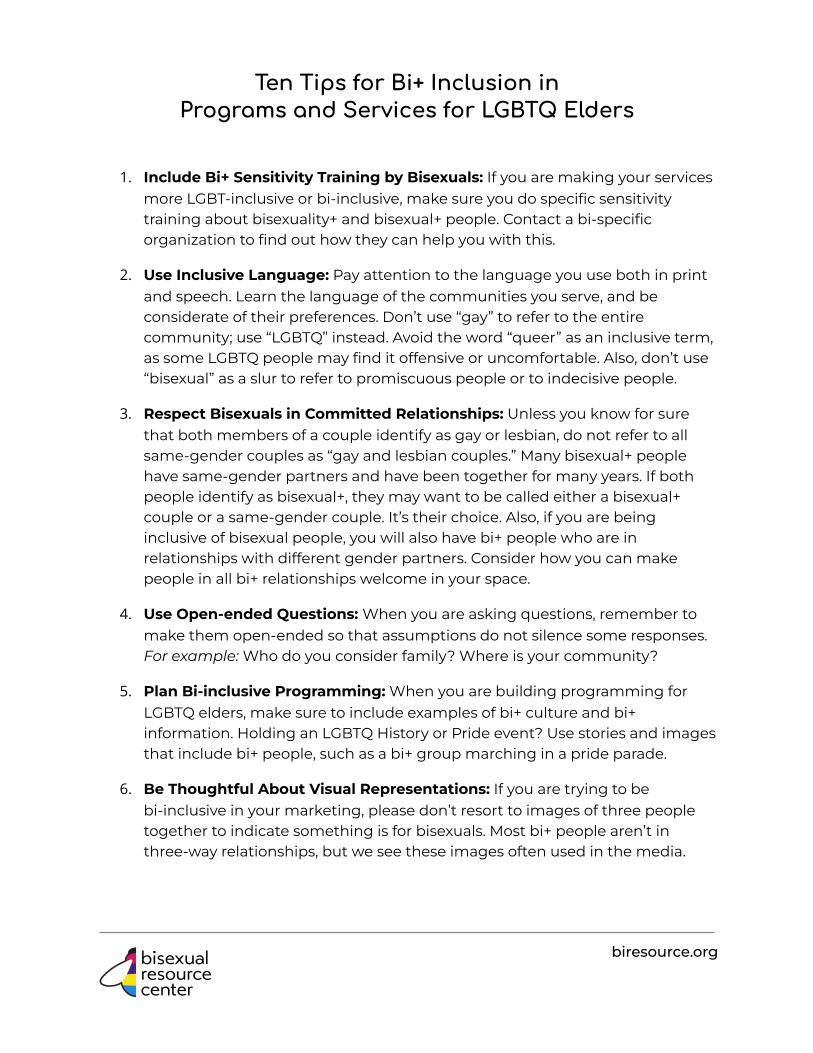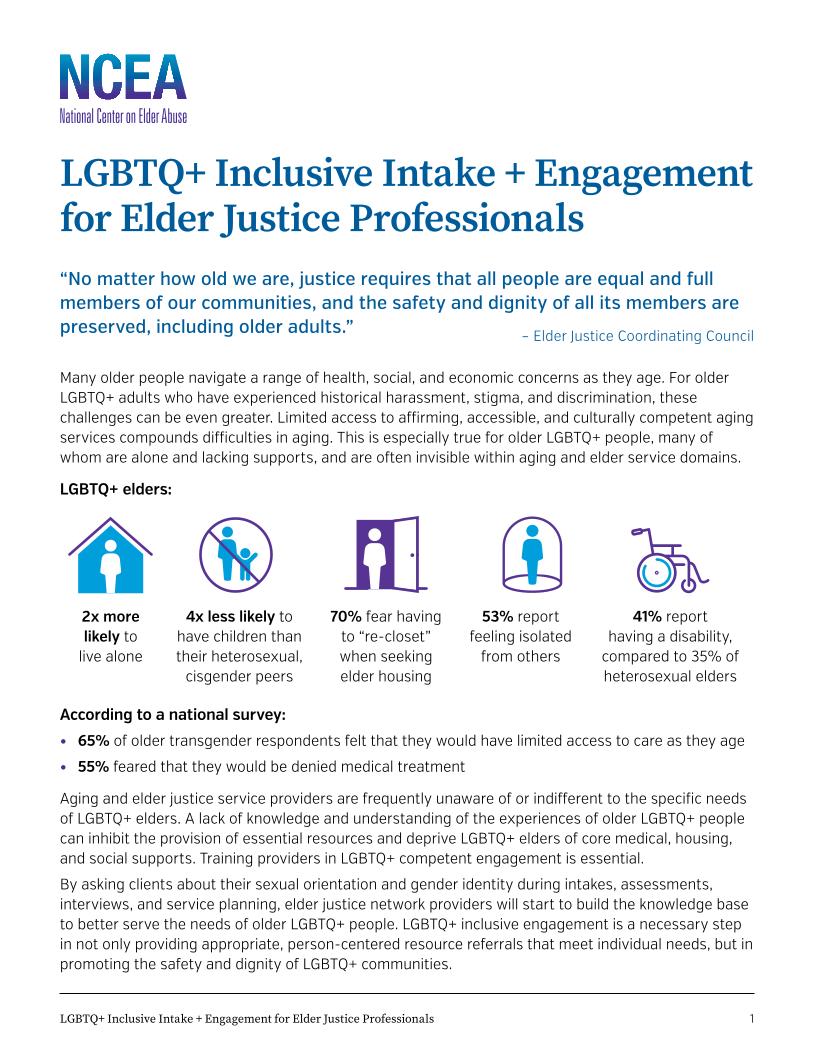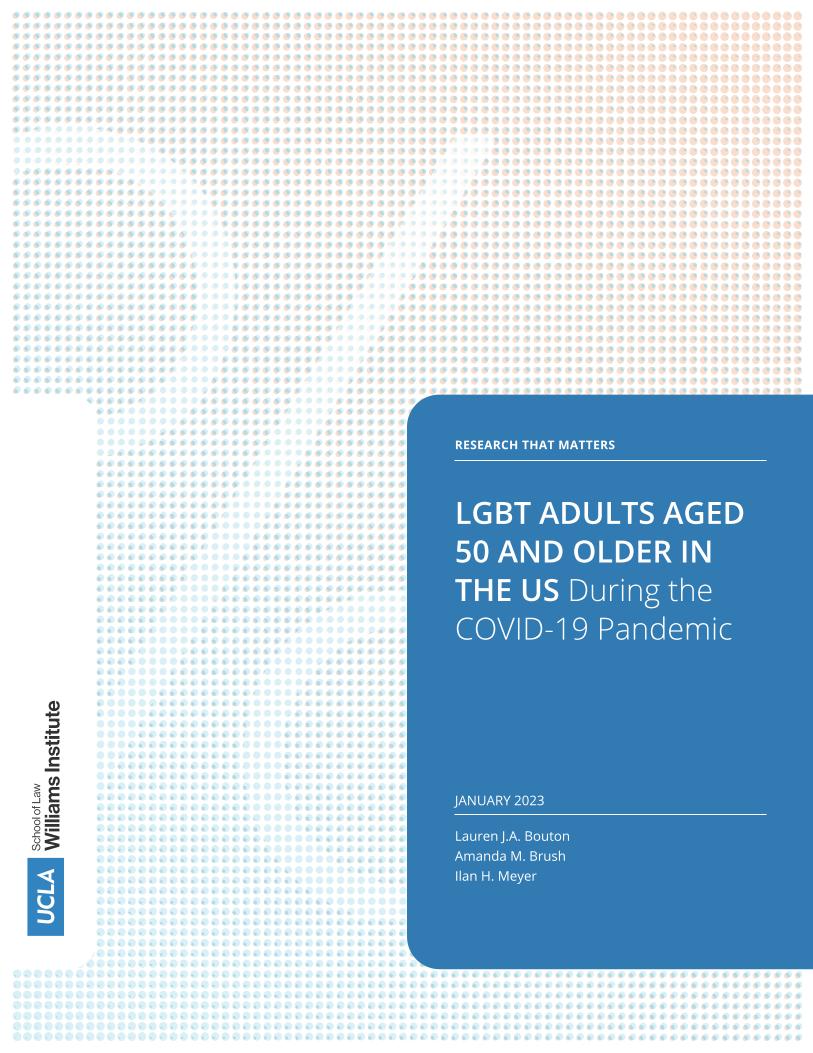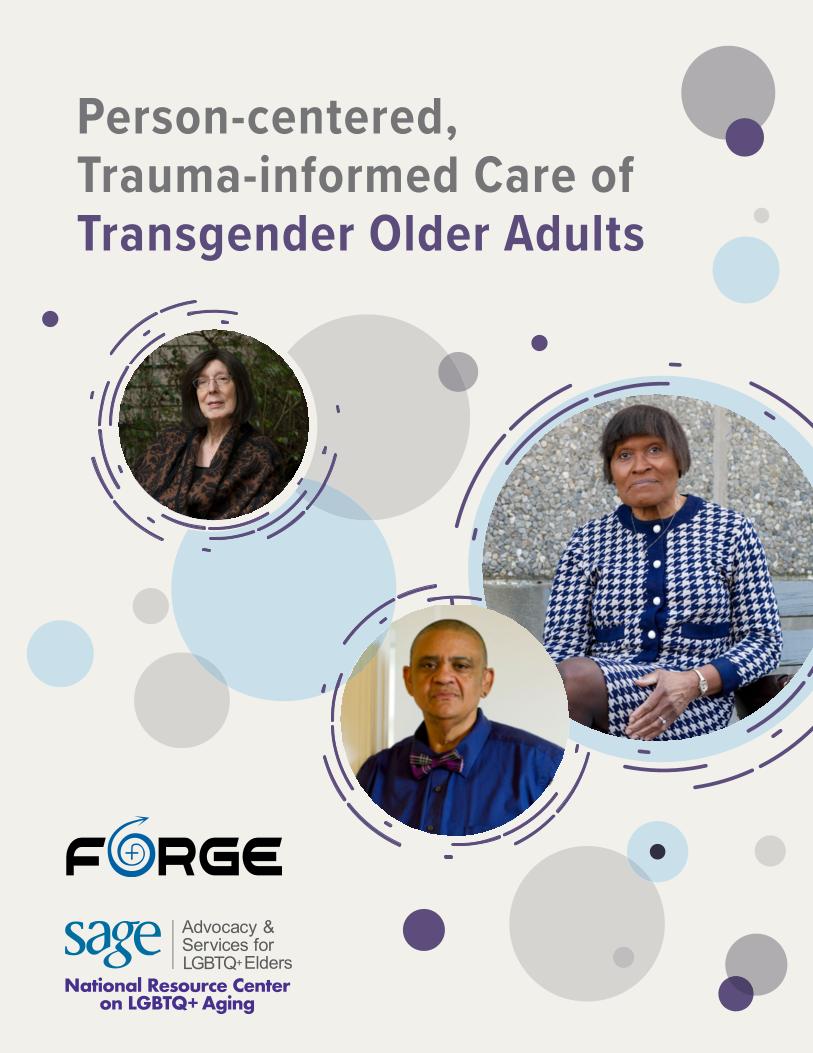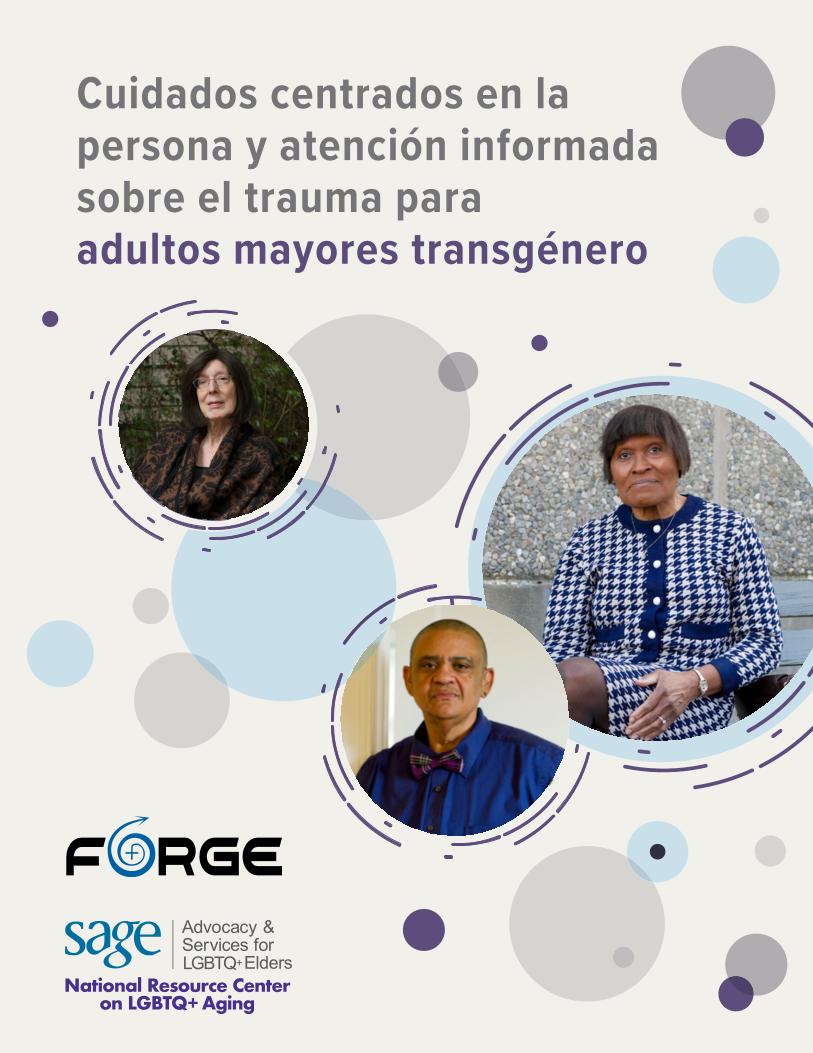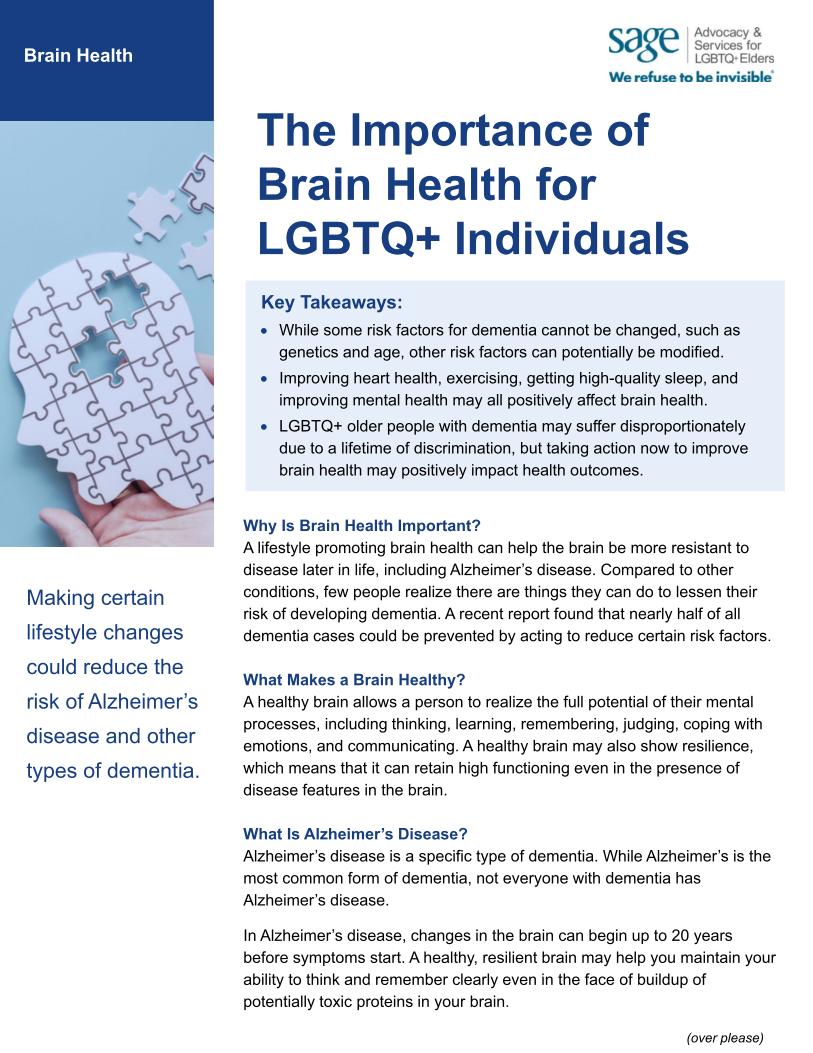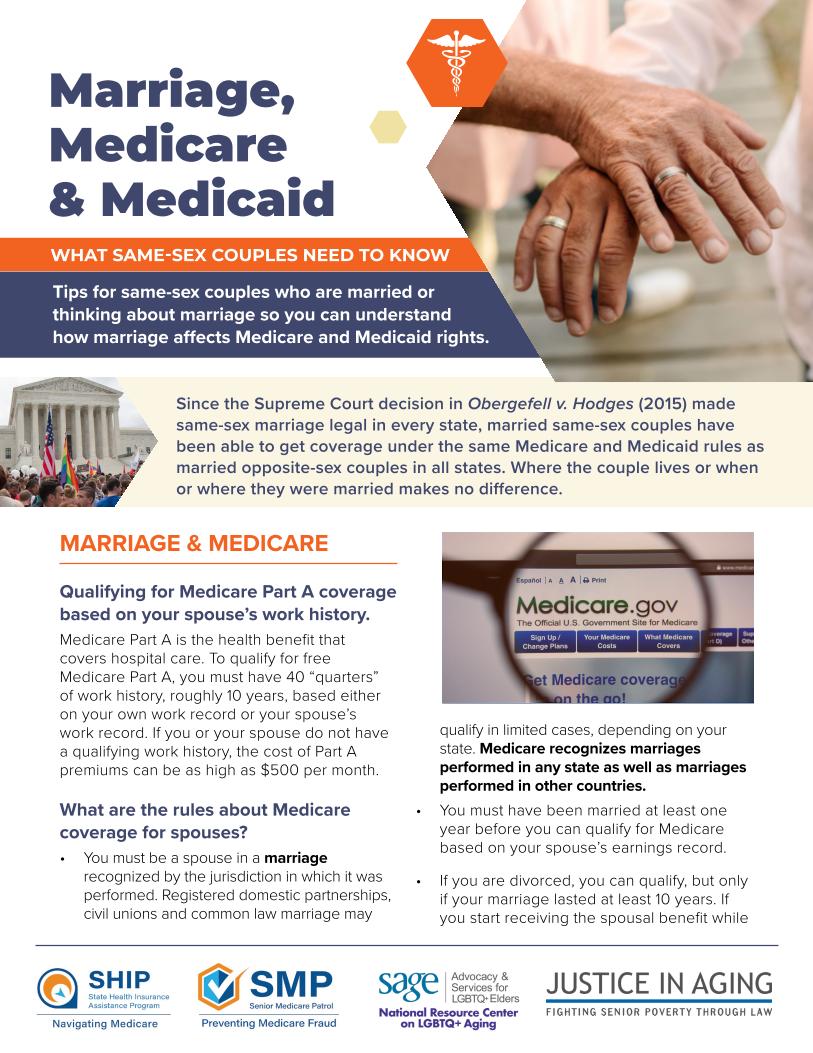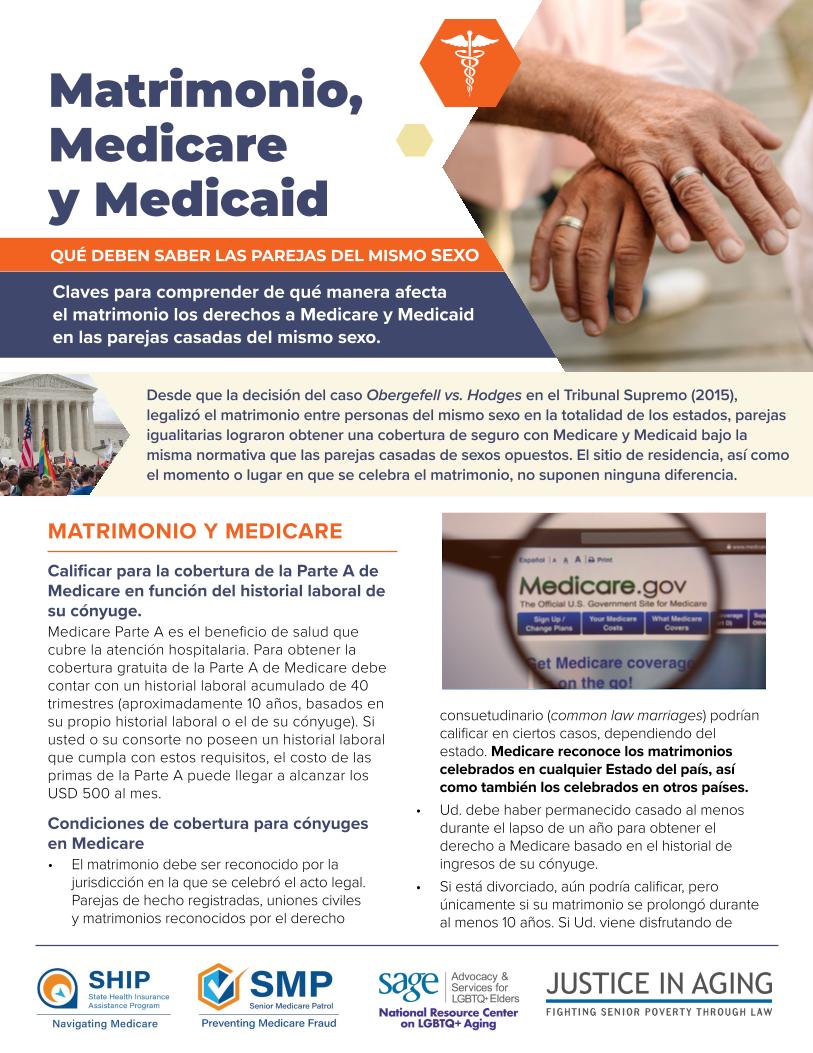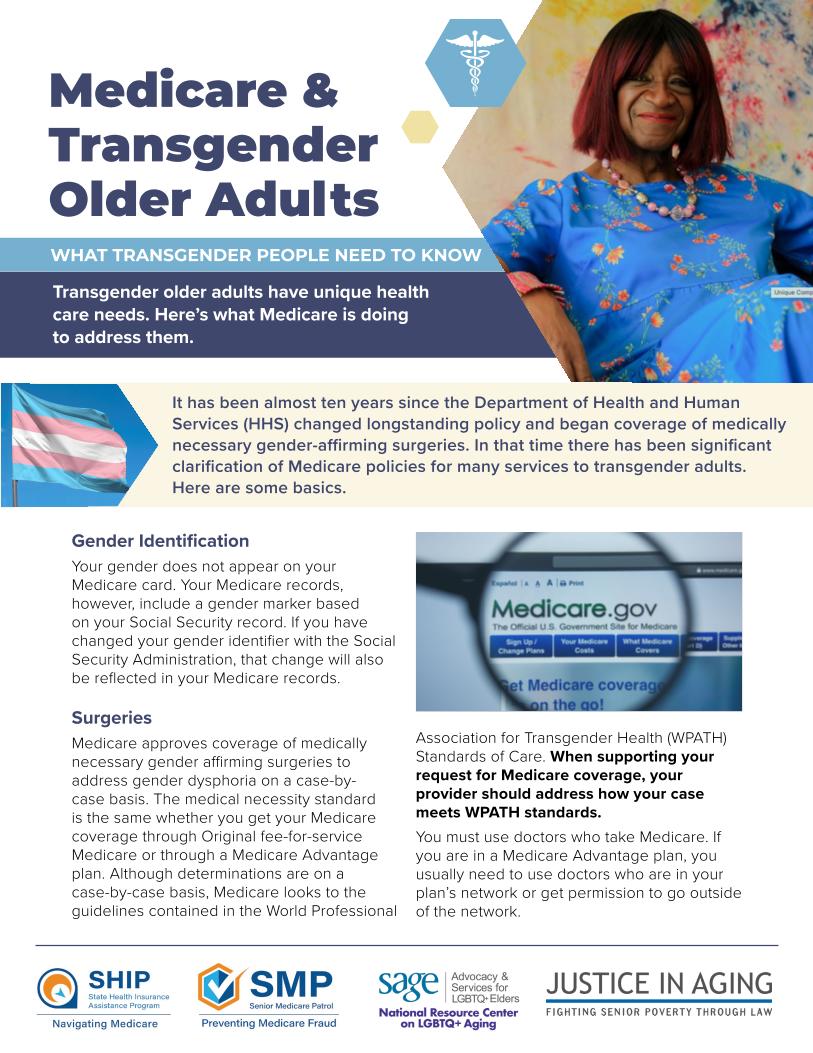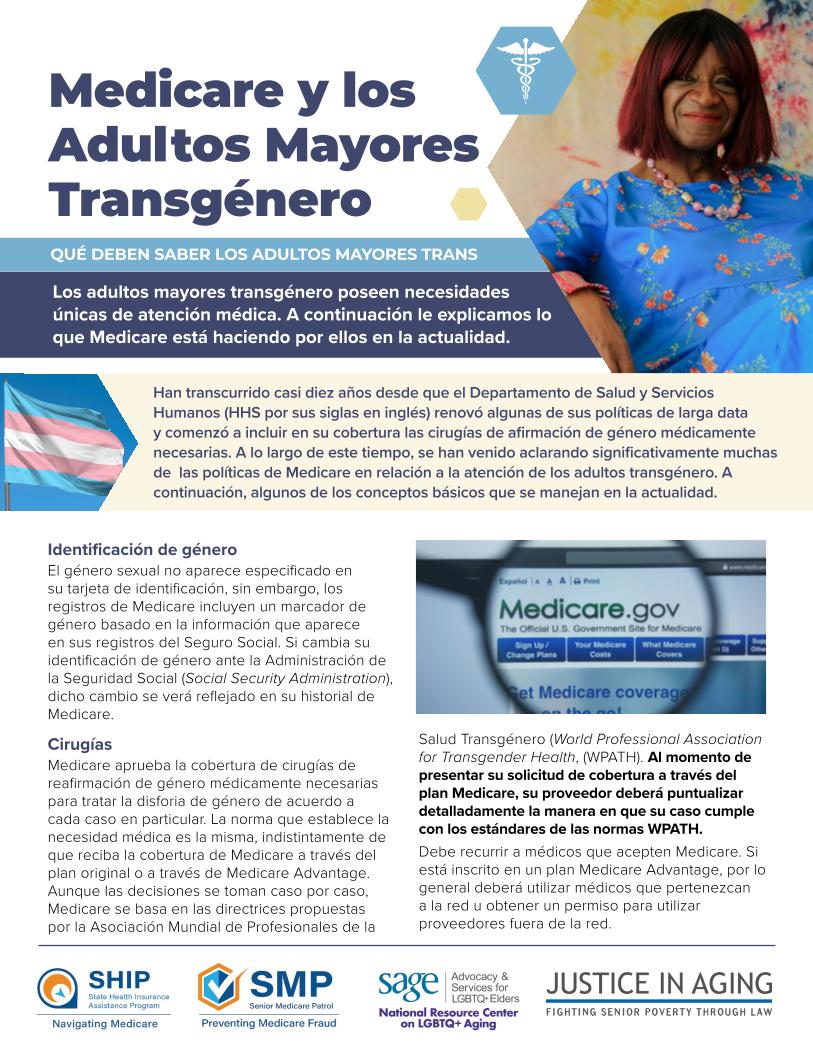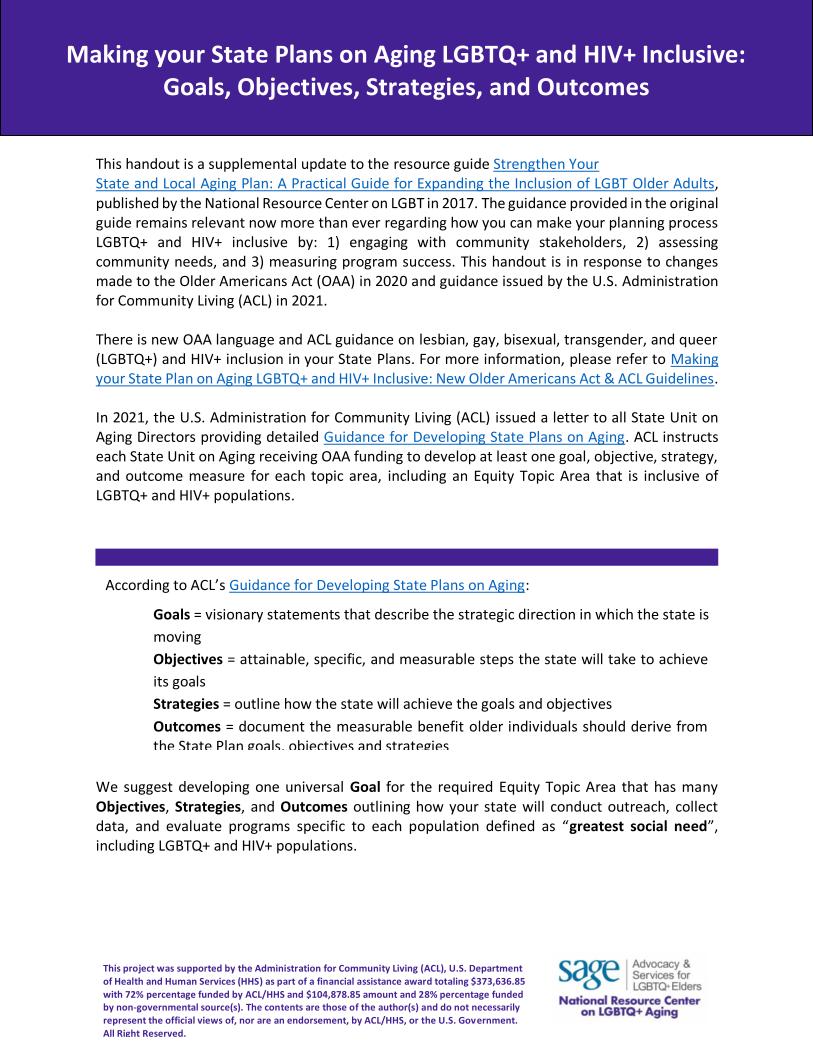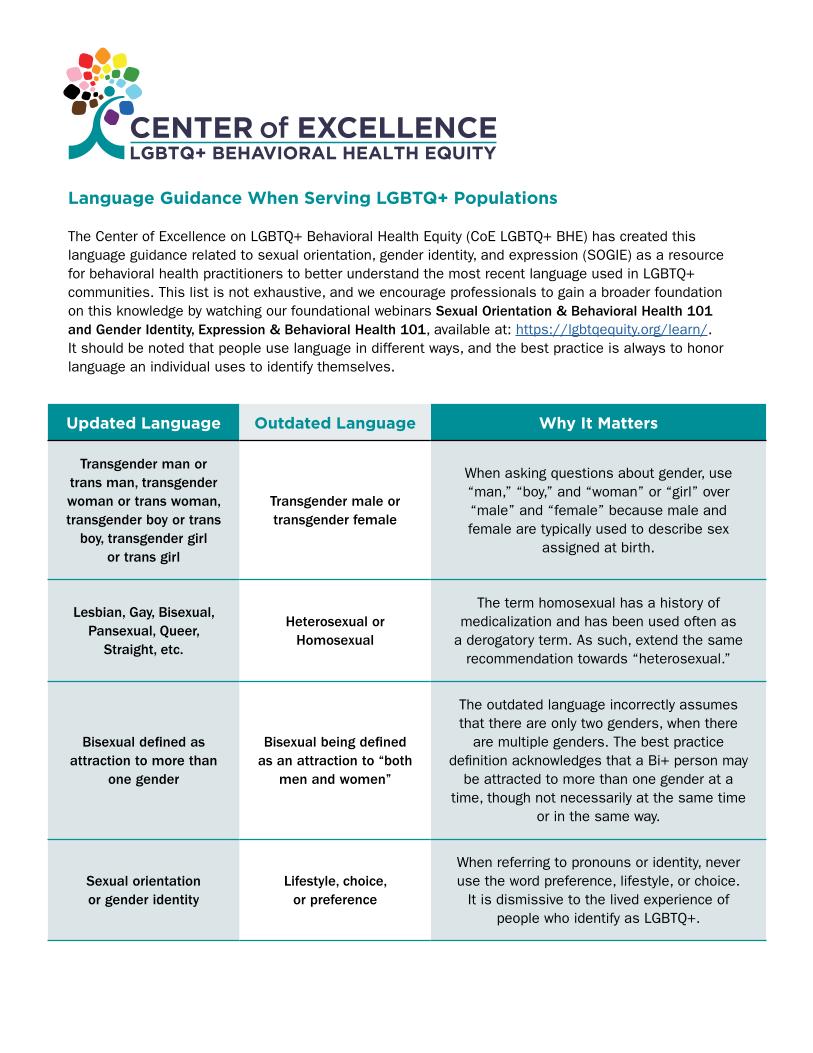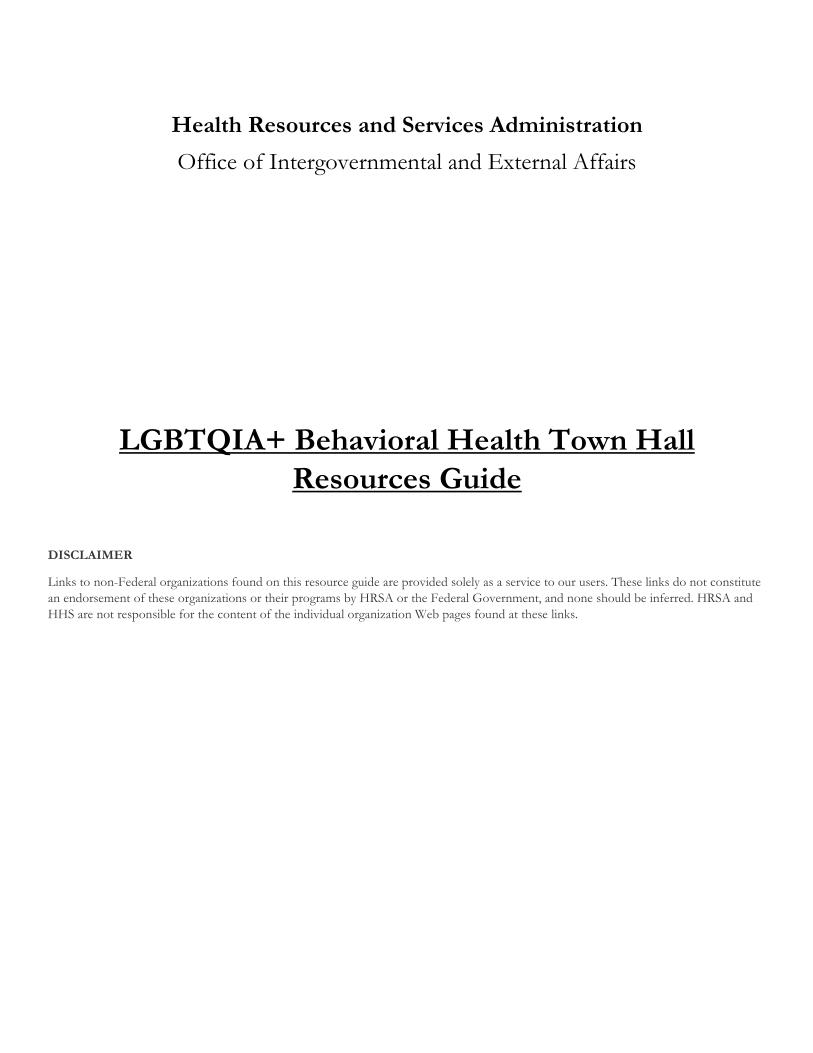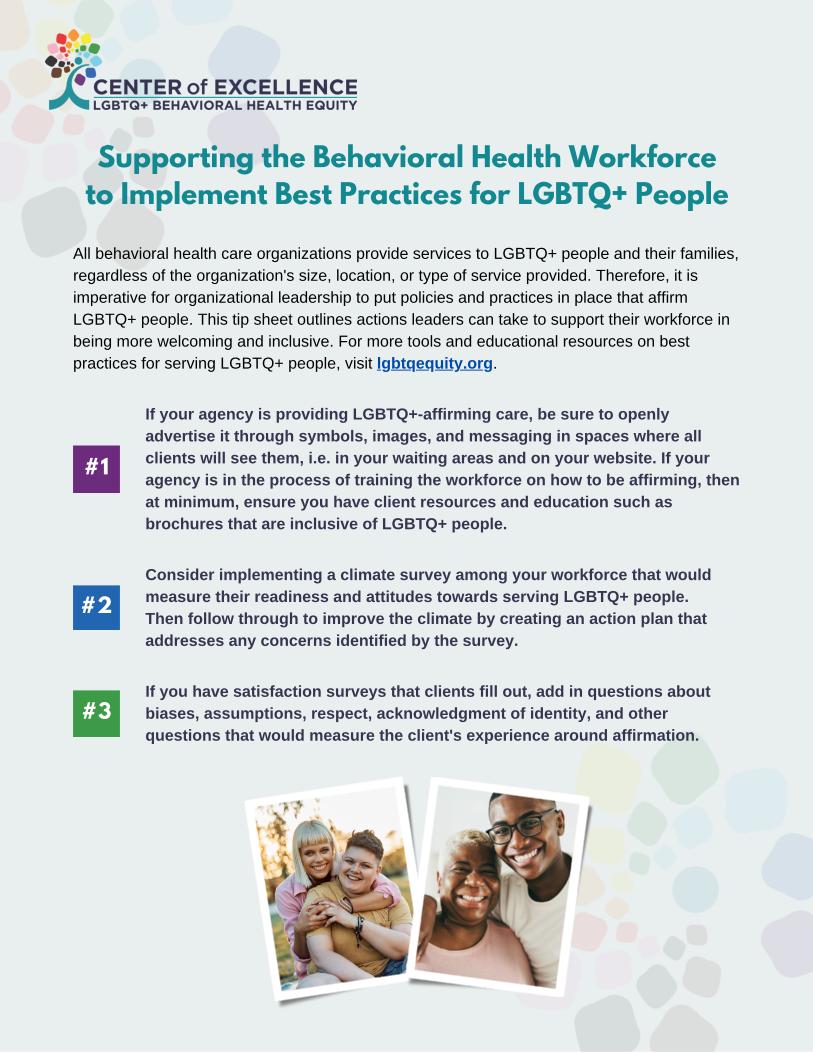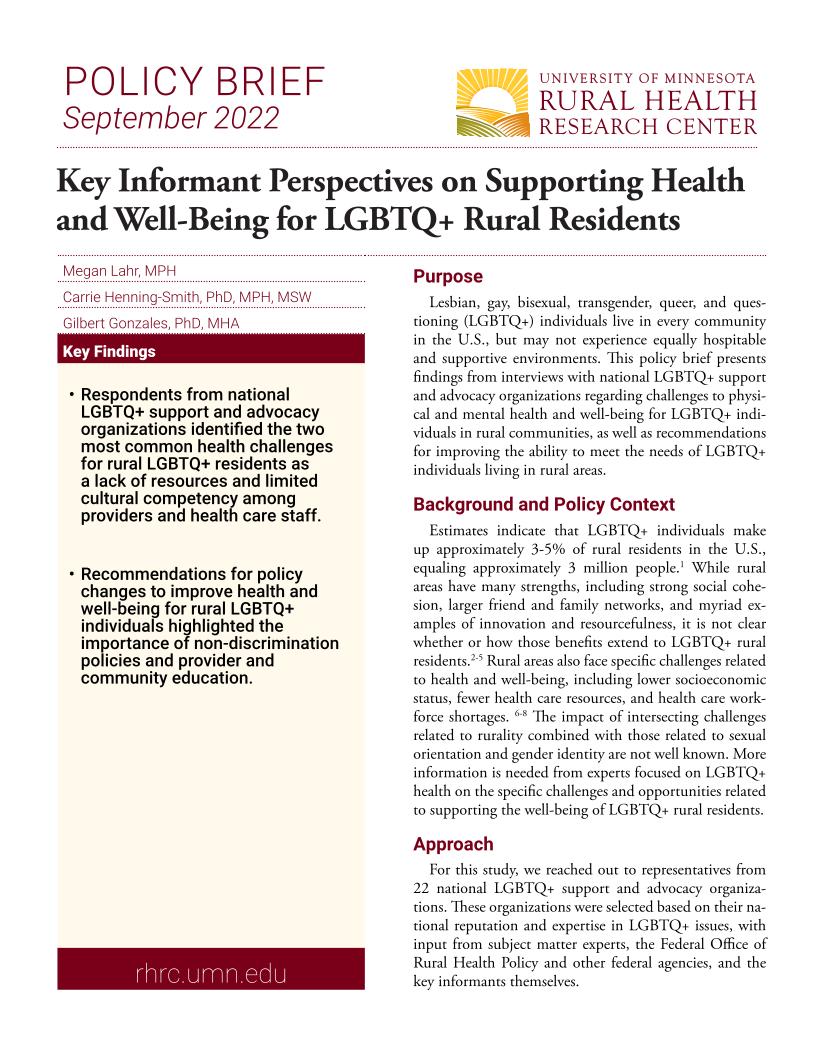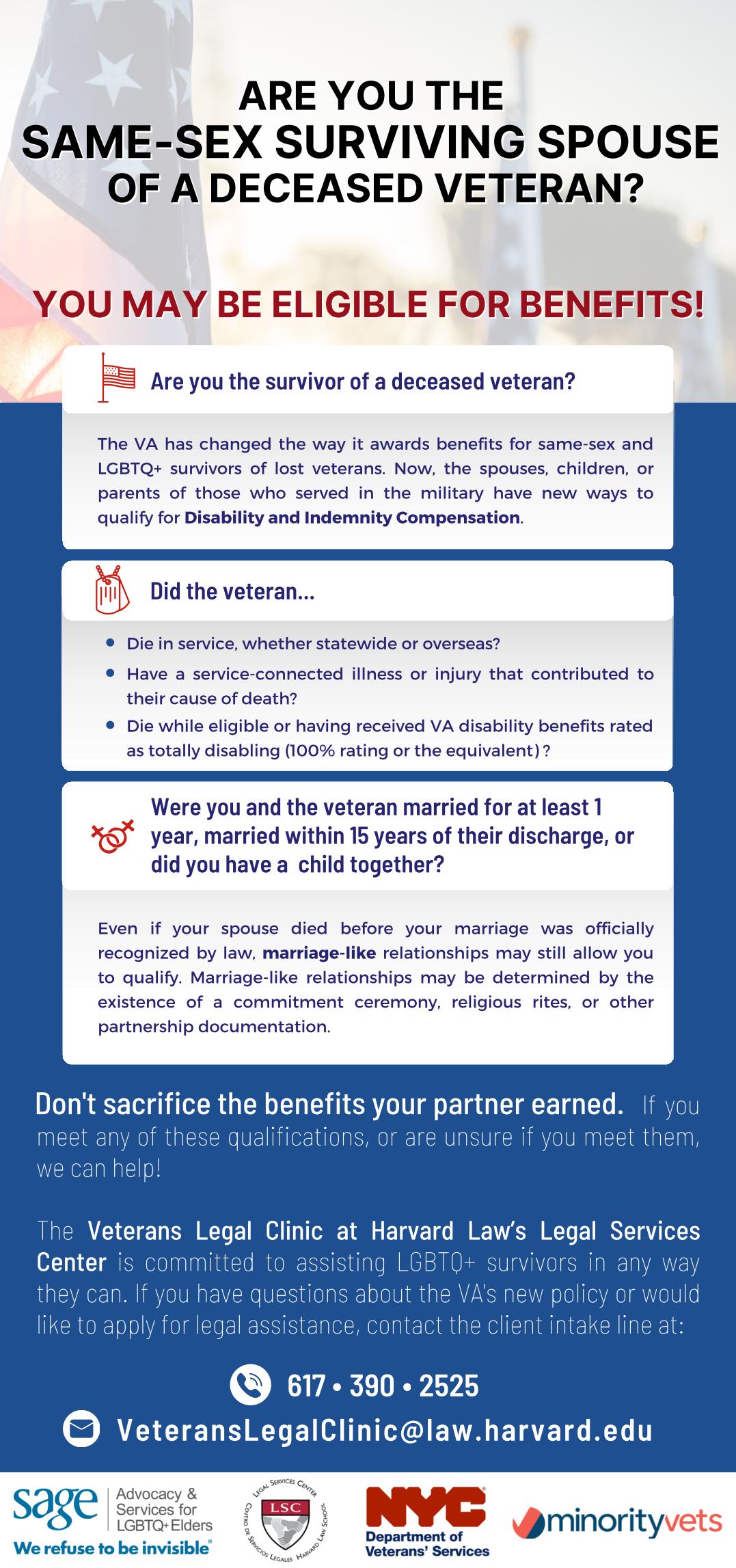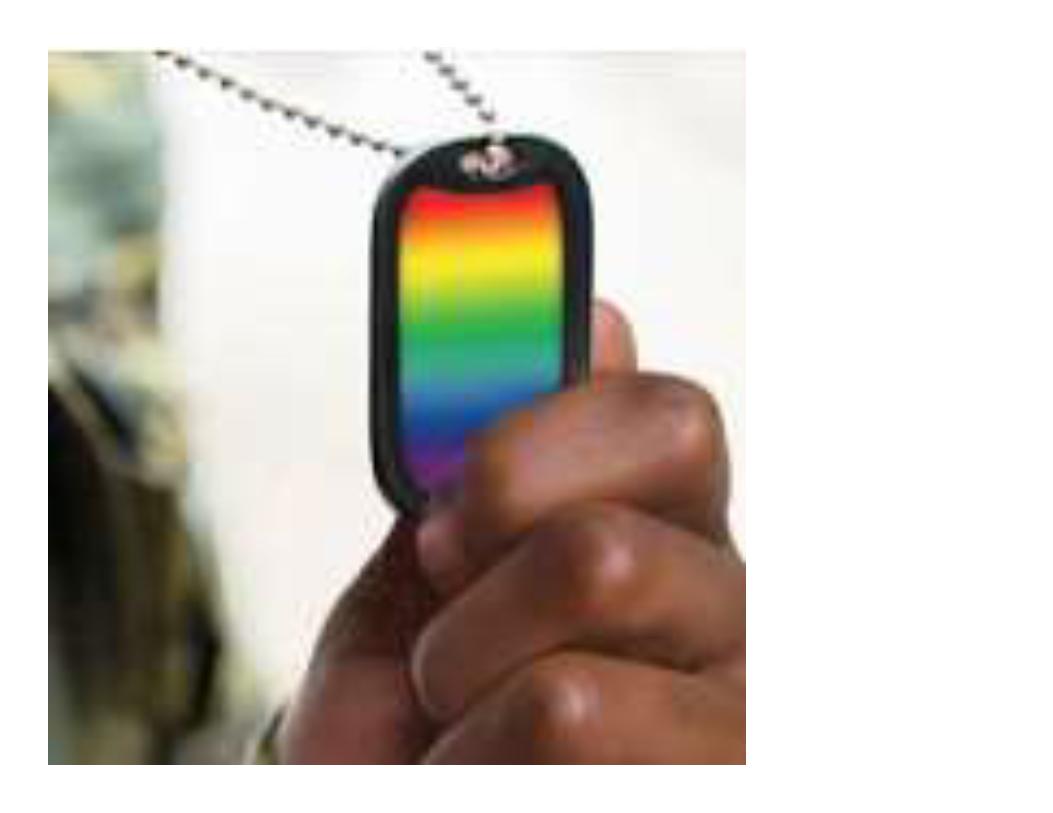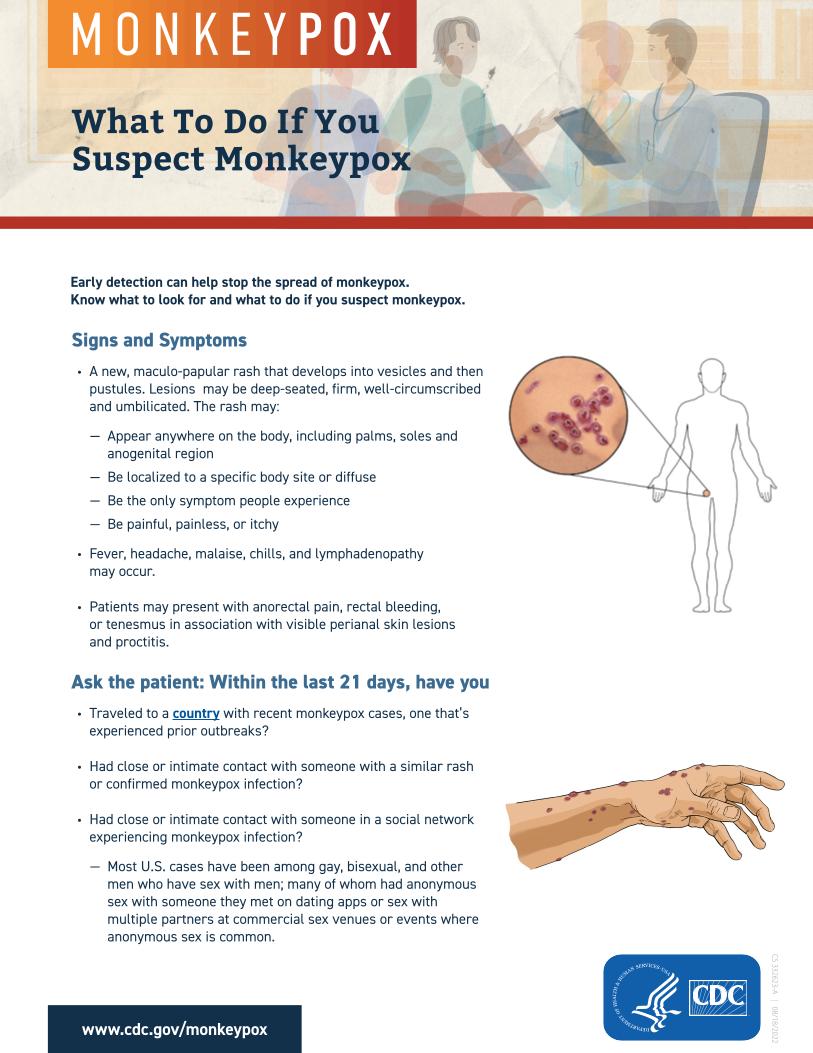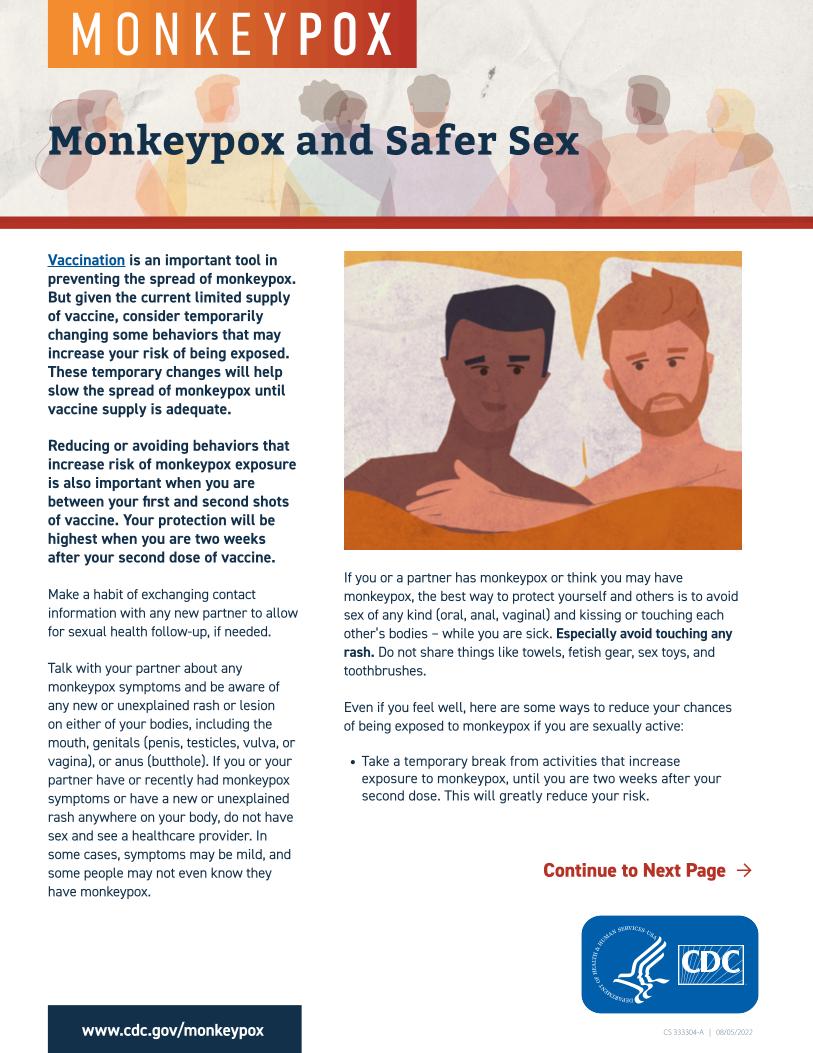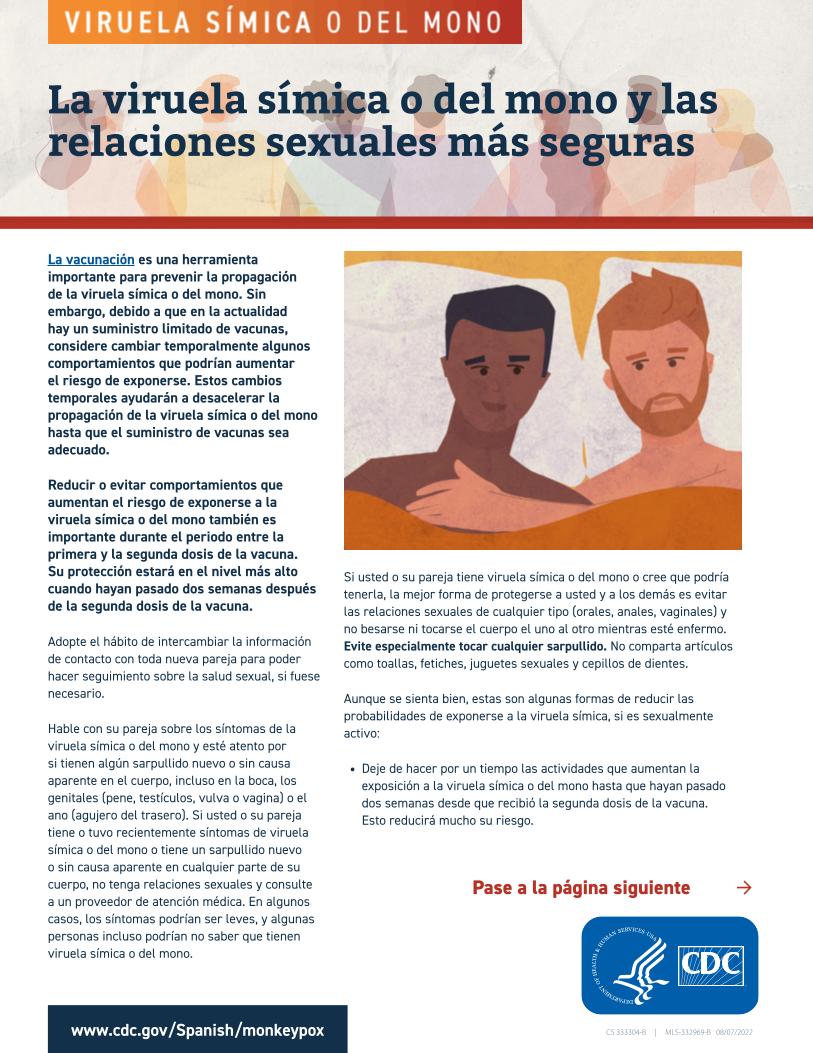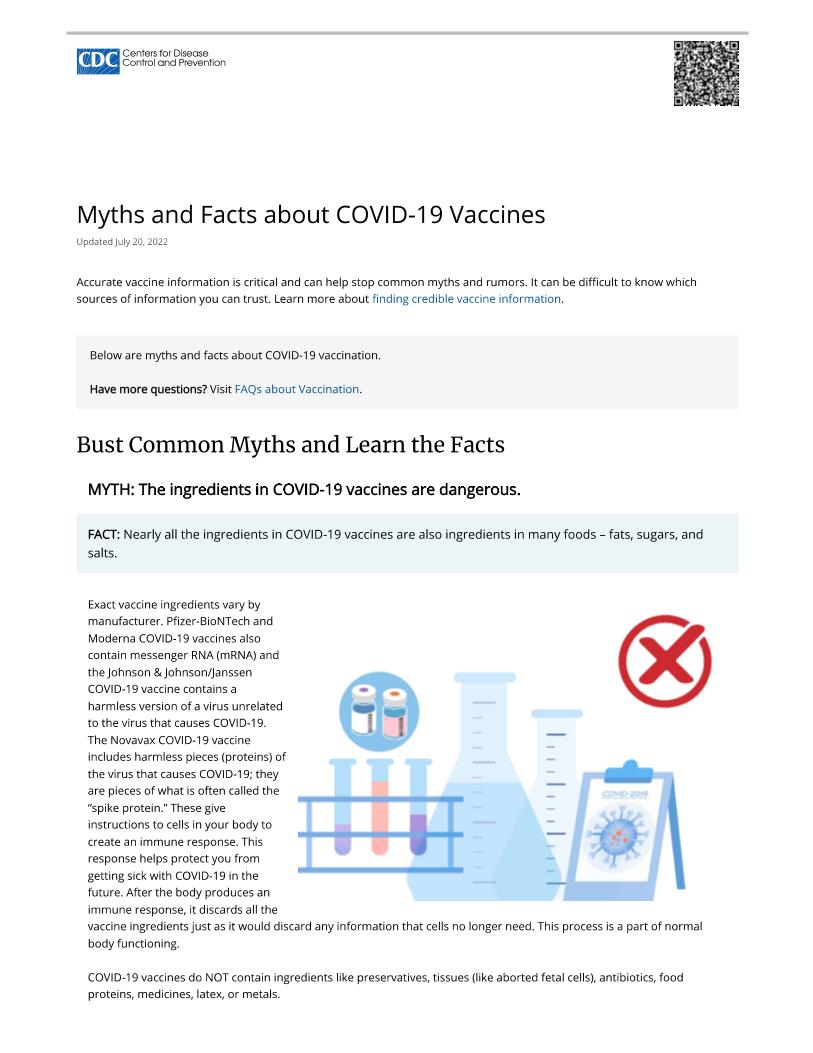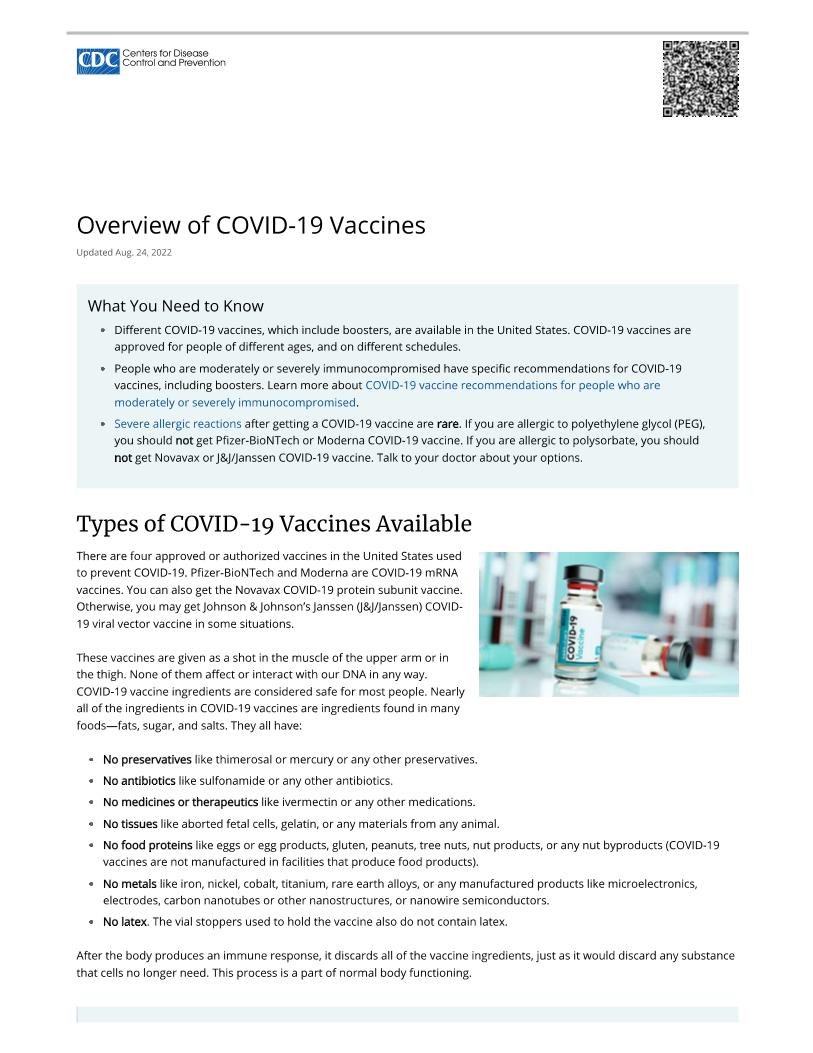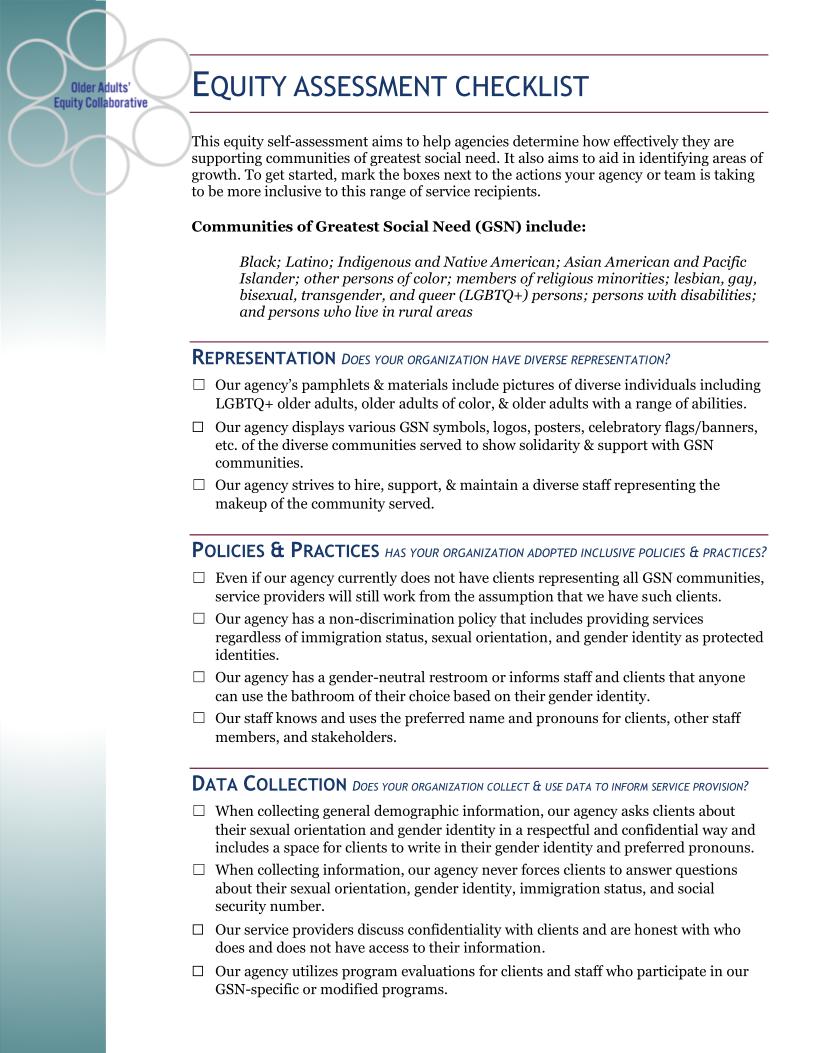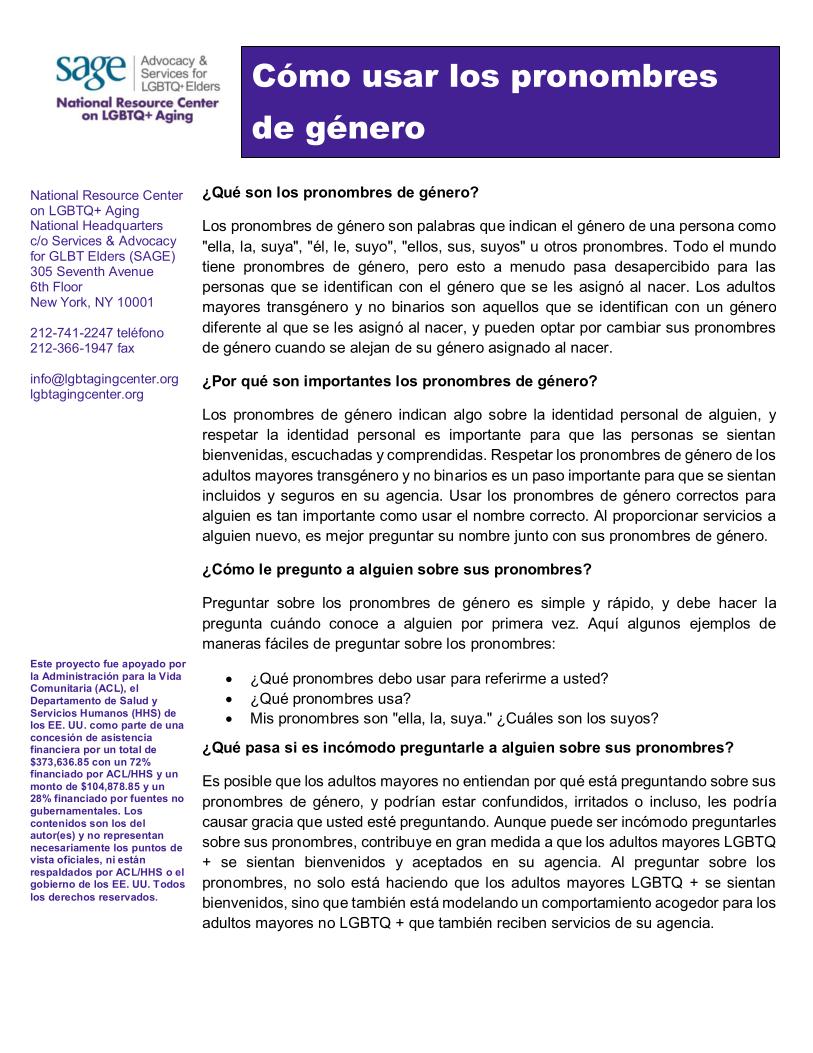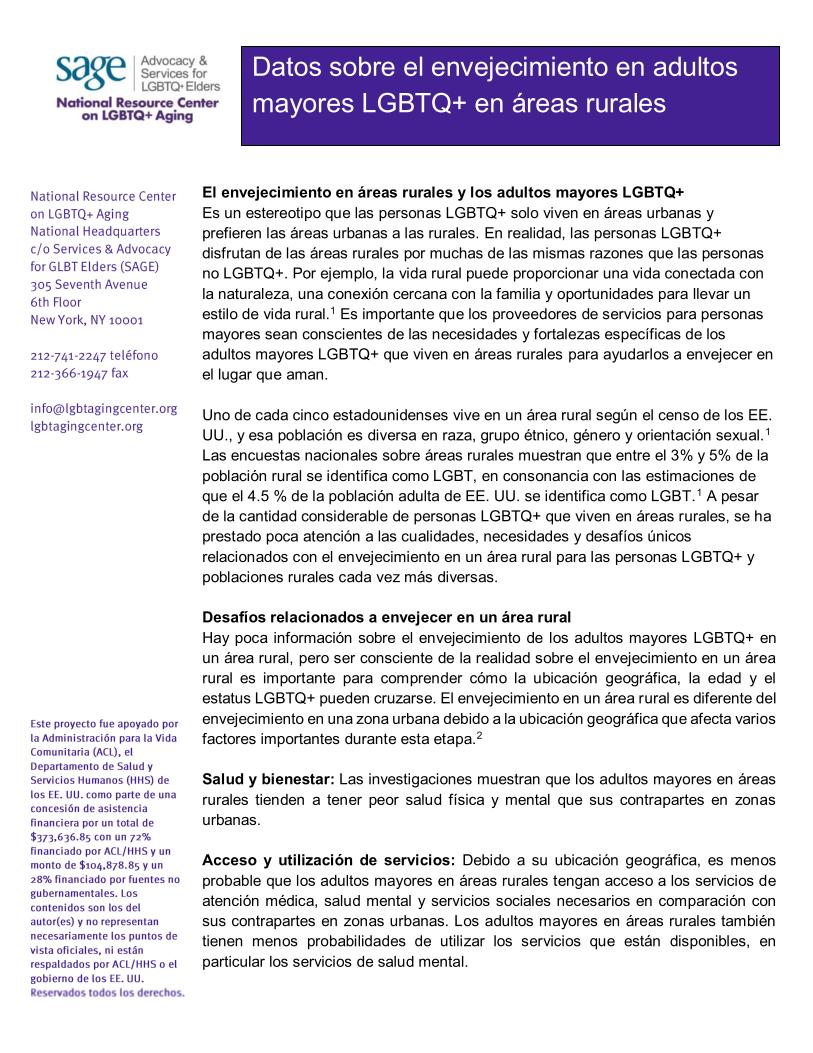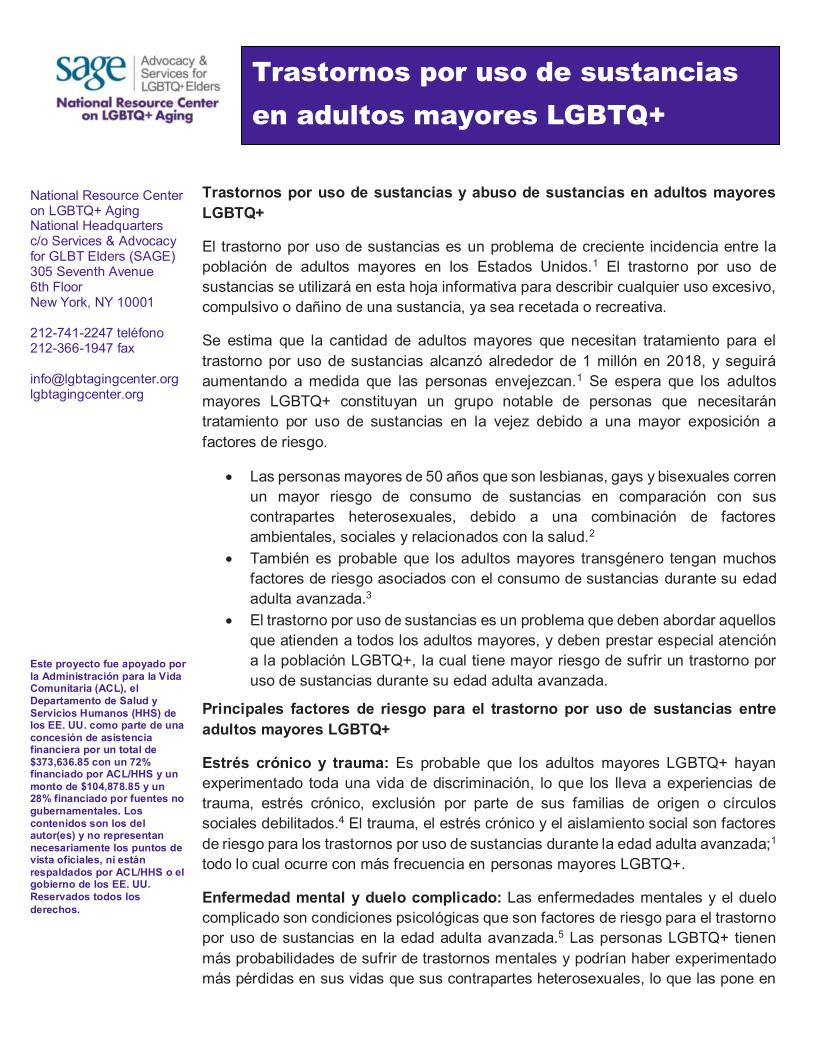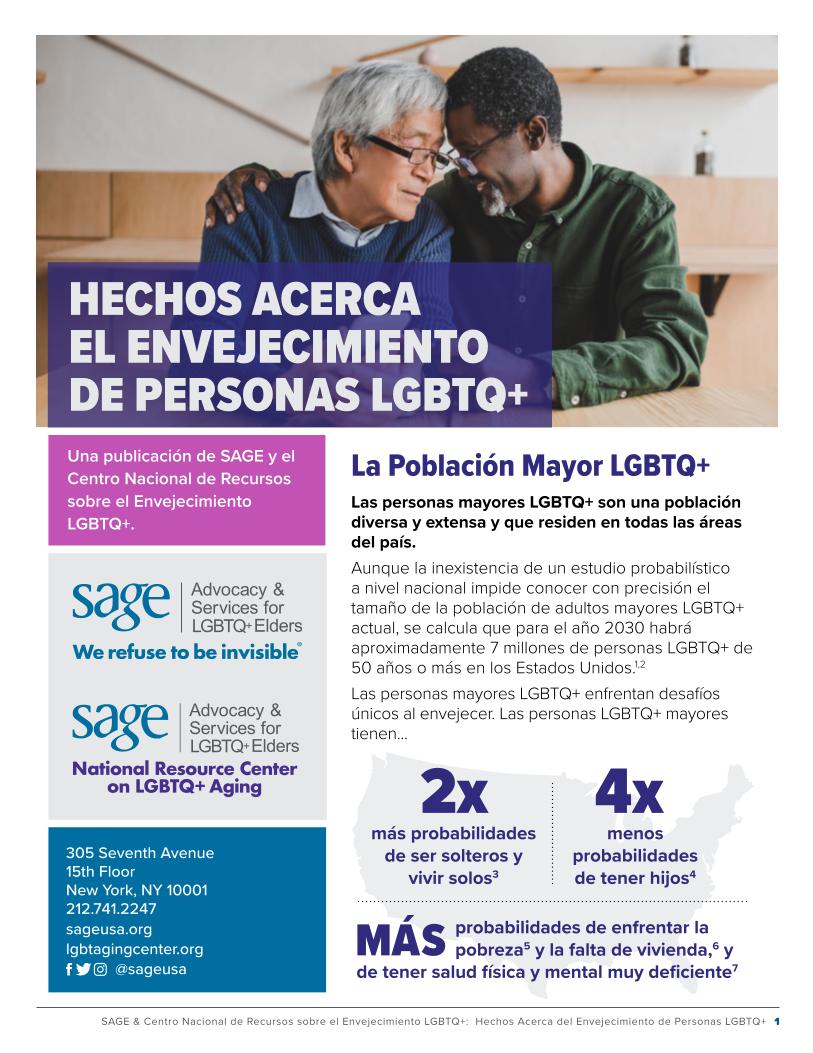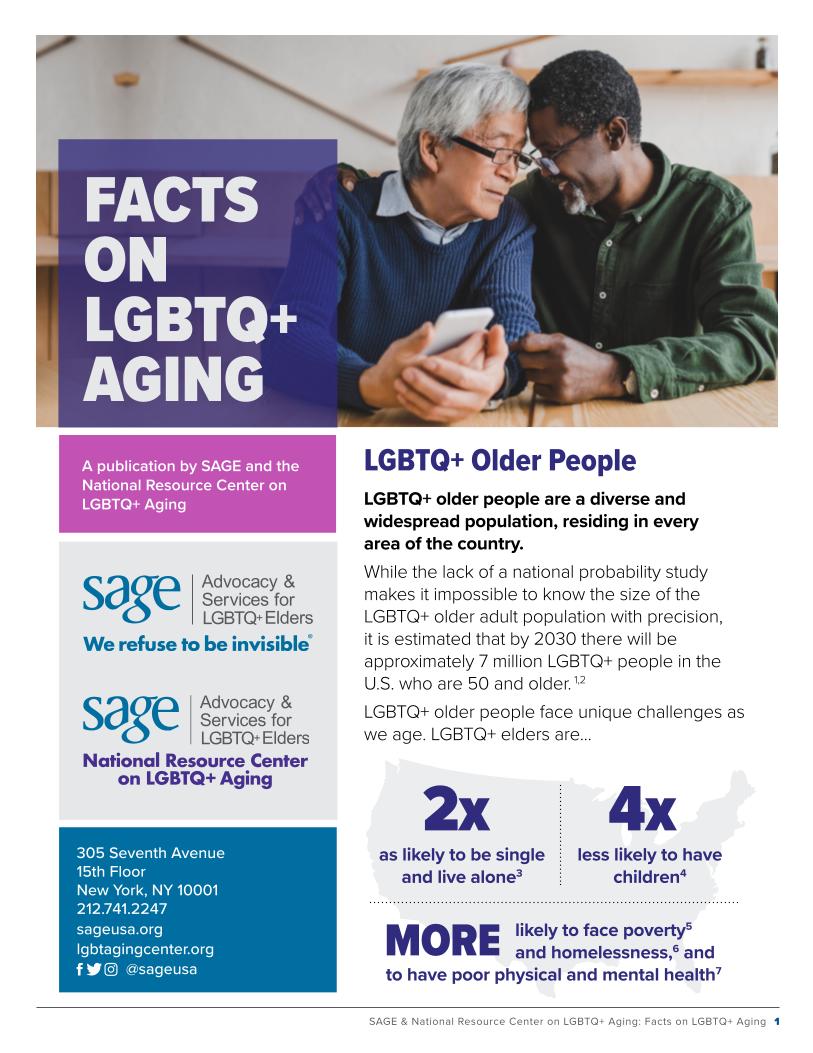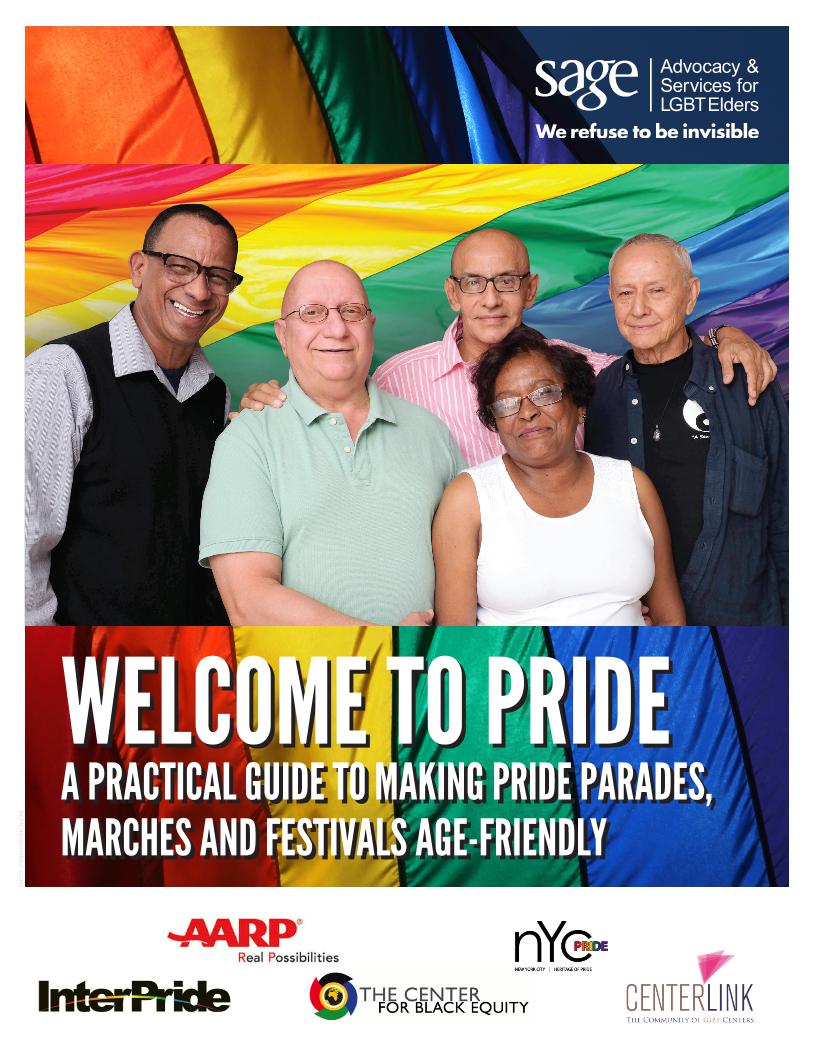National Honor LGBTQ+ Elder Day Resource Guide_2024 Update
May 16 is National Honor Our LGBT Elders Day, a time to pay tribute to those who have paved the way for the LGBT (Lesbian, Gay, Bisexual, and Transgender) community to obtain and continue to seek important legislation and rights. We have numerous elders to thank for the strides made over the last several decades towards equality.
April 2024 | National Center on Elder Abuse and SAGE National Resource Center on LGBTQ+ Aging
Learn More Download PDFPreparing to Engage with In-Home Aging Services: Tips for LGBTQ+ People
As we age, there may be times when we need to invite home and community based service providers into our homes. The fact sheet provides you with things to consider before, during and after the services are provided in your home.
April 2024 | Madeleine Thompson, SAGE Intern, MSW '24 Candidate
Learn More Download PDFPreventing Elder Abuse: LGBTQ+ Elder Justice
The National Center on Elder Abuse and SAGE National Resource Center on LGBTQ+ Aging developed this presentation to support public awareness related to elder justice and LGBTQ+ communities. You are encouraged to use these materials in your community and networks.
April 2024 | National Center on Elder Abuse and SAGE National Resource Center on LGBTQ+ Aging
Learn More Download PDFLGBTQ+ Advance Care Planning Toolkit
A step-by-step guide for the LGBTQ+ community in preparing for healthcare needs and end-of-life decisions.
January 2024 | Eliza Giles, MSN, RN, AGCNP, CHPN, SAGE Intern
Learn More Download PDFPLANIFICACIÓN anticipada de cuidados de salud para LGBTQ+
Una guía dirigida a los miembros de la comunidad LGBTQ+ con los pasos necesarios para prepararse ante eventuales necesidades de salud y decisiones sobre el final de la vida.
January 2024 | Eliza Giles, MSN, RN, AGCNP, CHPN, SAGE Intern
Learn More Download PDFAbordar las disparidades relacionadas con las enfermedades cardiovasculares entre los adultos mayores LGBTQ+
Los adultos LGBTQ+ se enfrentan a factores de estrés únicos debido a su orientación sexual e identidad de género, lo que los expone a un mayor riesgo de disparidades relacionadas con la salud cardiovascular.
January 2024 | SAGE and Amgen, Inc
Learn More Download PDFAddressing Disparities in Cardiovascular Disease Among LGBTQ+ Older People
LGBTQ+ adults face unique stressors due to their sexual orientation and gender identity, putting them at higher risk for cardiovascular health disparities.
January 2024 | SAGE and Amgen Inc
Learn More Download PDFPlanning for Lifelong Care Webinar Q&A
Written responses to question asked during the webinar Planning for Lifelong Care for Transgender and Nonbinary People.
December 2023 | Ames Simmons, Duke Law
Learn More Download PDFPlanning For Lifelong Care: Guiding Questions For Transgender & Non-Binary People Webinar
The SAGE National Resource Center is joined by the Transgender Law Center for the webinar Planning for Lifelong Care Webinar - Guiding Questions for Transgender & Non-binary People to Plan for Dementia and Other Serious Illnesses.
November 2023
Learn More Go to Web SiteRemembering LGBTQ+ History and the Stonewall Generation
A look back on the experiences and stories of the LGBTQ+ Stonewall generation with author and researcher, Dr. Jane Fleishman.
October 2023 | Dr. Jane Fleishman
Learn More Download PDFLong-Term Care Services and Supports: LGBTQ+ Equity
SAGE, the National Center on Elder Abuse (NCEA), the Consumer Financial Protection Bureau (CFPB), and the Federal Trade Commission (FTC) present this webinar on LGBTQ+ Equity and Elder Justice within the long-term care services and supports network.
September 2023 | SAGE, CFPB, FTC, NCEA
Learn More Download PDFYou've Got This - Flu and COVID Vaccine Collaborative
The Aging and Disability Vaccination Collaborative, powered by USAging, has partnered with community providers in your area to make getting your shots easy. Get access to services such as: • Free local clinics • Transportation to and from the clinics • In-home vaccinations • Onsite consultations from a healthcare expert
September 2023
Learn More Download PDFRyan White HIV/AIDS Program Part A Planning Councils: Address the Needs of Individuals Aging with HIV
This toolkit provides an overview of Ryan White HIV/AIDS Program (RWHAP) Planning Councils, how they function, how individuals can get involved, and how Planning Councils can be used to advance the priorities of individuals aging with HIV.
September 2023 | SAGE
Learn More Download PDFTaking Pride in Brain Health: Parkinson's Disease and the LGBTQ+ Community
Learn about brain health, Parkinson's Disease and the LGBTQ+ community in this webinar hosted by the Michael J. Fox Foundation for Parkinson's Research and SAGE.
September 2023 | hosted by: Michael J Fox Foundation for Parkinson's Research and SAGE
Learn More Download PDFSAGECare LGBTQ+ Cultural Competency Training
SAGECare provides a suite of in-person and online trainings for all levels of staff and volunteers. These trainings assist you in learning the best ways to create an inclusive, safe, and welcoming environment for your LGBTQ+ older adult population. The SAGECare webiste provides a listing of SAGECare trained and credentialed businesses. .
September 2023
Learn More Go to Web Site | 212.741.2247Planning for Lifelong Care: Guiding Questions for Transgender & Non-Binary People to Plan for Dementia and Other Serious Illness
This guide provides tips and resources on planning and care for transgender and non-binary people.
September 2023 | Simmons, A., Madhav, K., & Ortiz, A. (2023). Planning for Lifelong Care: Guiding Questions for Transgender and Non-Binary People to Plan for Dementia and Other Serious Illness. Oakland, CA: Transgender Law Center.
Learn More Download PDFDepression and the LGBTQ+ Elder Community
If you’re an LGBTQ+ individual and experiencing symptoms of depression, you are NOT alone. This fact sheet provides an overview of depression and resources available.
August 2023 | SAGE
Learn More Download PDFArea Agencies on Aging: Local Leaders in Aging Well at Home
This brochure features an overview of the latest data gathered from AAAs nationwide to provide a snapshot of the evolving role these vital agencies play in the planning, development, coordination and delivery of a broad range of aging and other home and community-based services in every community in the United States.
August 2023 | USAging
Learn More Download PDFHealth Equity & LGBTQ+ Older Adults of Color: Engaging Individuals, Communities, and Organizations
July 2023 | SAGE National Resource Center on LGBTQ+ Aging
Learn More Download PDFEquidad en salud para los adultos mayores LGBTQ+ de color: Comprometiendo a individuous, comuidades y organizaciones
July 2023 | SAGE, National Resource Center on LGBTQ+ Aging
Learn More Download PDFFacts on LGBTQ+ Aging
This recording provides a basic overview of facts associated with LGBTQ+ Aging.
July 2023 | SAGE National Resource Center on LGBTQ+ Aging
Learn More Go to Web SiteHechos sobre el enveiecimiento en personas LGBTQ+
Esta grabación proporciona una descripción general de los hechos relacionados con el envejecimiento LGBTQ+.
July 2023
Learn More Go to Web SiteLocal Community Advocacy
This recording provides an overview of local aging services and programs, how LGBTQ+ advocates and organizations like yourself can get involved, and how Aging Advisory Councils can advance the priorities and address the needs of older LGBTQ+ people.
July 2023
Learn More Go to Web SiteAbogacia comunitaria local
Esta grabación brinda una descripción general de los servicios y programas locales para personas mayores, cómo los defensores LGBTQ+ y las organizaciones como usted pueden involucrarse y cómo los Consejos Asesores para Personas Mayores pueden promover las prioridades y abordar las necesidades de las personas mayores LGBTQ+.
July 2023
Learn More Go to Web SiteHistory of the LGBTQ+ Community
This recording explores the historical events related to that have shaped LGBTQ+ communities.
July 2023
Learn More Go to Web SiteHistoria de la comunidad LGBTQ+
Esta grabación explora los eventos históricos relacionados que han dado forma a las comunidades LGBTQ+.
July 2023
Learn More Go to Web SiteRolling Up Our Sleeves with PRIDE: The Importance of Updated COVID Vaccines for LGBTQ+ Health
On May 18, 2023 SAGE hosted an engaging discussion about LGBTQ+ health and COVID vaccines. Hear from LGBTQ+ elders, researchers, and experts in the field.
May 2023
Learn More Go to Web SiteSAGECollab Partners
SAGECollab is a network of diverse non-profit LGBTQ+ organizations/groups throughout the country including Puerto Rico that are providing support, advocate for public policy changes, and inspire each other to better support and empower older LGBTQ+ people everywhere.
May 2023
Learn More Download PDFFinancial Wellness and Older LGBTQ+ People
May 2023 | Consumer Fraud Protection Bureau, Federal Trade Commission, National Center on Elder Abuse and SAGE
Learn More Download PDFJust Us - A Q&A with Researcher and Filmmaker Carey Candrian
Just Us: The longing and hope of LGBTQ people
May 2023 | Carey Candrian, PhD
Learn More Download PDFQ&A Response and Resources Coast to Coast LGBTQ+ Inclusive State Plans
Q&A Responses and Resources from recorded webinar, Coast to Coast: LGBTQ+ Inclusive State Plans.
April 2023
Learn More Download PDFPreguntas inclusivas para adultos mayores: Una guía práctica para recopilar datos sobre orientación sexual e identidad de género
March 2023 | SAGE National Resource Center on LGBTQ+ Aging
Learn More Download PDFInclusive Questions for Older Adults: A Practical Guide to Collecting Data on Sexual Orientation and Gender Identity
Revised in 2023 - This guide helps service providers learn how to ask questions about sexual orientation and gender identity to older adults in safe and respectful ways.
March 2023 | National Resource Center on LGBT Aging
Learn More Download PDFTen Tips for Bi+ Inclusion in Programs and Services for LGBTQ Elders
This fact sheet explores tips for Bi+ inclusion in programs and services for LGBTQ elders.
March 2023 | Bisexual Resource Center
Learn More Download PDFLGBTQ+ Inclusive Intake + Engagement for Elder Justice Professionals
Many older people navigate a range of health, social, and economic concerns as they age. For older LGBTQ+ adults who have experienced historical harassment, stigma, and discrimination, these challenges can be even greater. This fact sheet provides elder justice professionals with tips and resources for engaging with LGBTQ+ adults.
February 2023 | NCEA, Academy for Professional Excellence, APSWI, Keck School of Medicine, SAGE National Resource Center
Learn More Download PDFLGBT Adults Aged 50 and Older In The US During the COVID-19 Pandemic
Using data from the U.S. Census Household Pulse Survey (HPS) collected July 21, 2021 to August 8, 2022, we explore the demographics, health, and economic experiences of older LGBT adults during the COVID-19 pandemic as compared with straight/cisgender older adults.
January 2023 | Williams Institute authored by, Lauren J.A. Bouton, Amanda M. Brush, Ilan H. Meyer
Learn More Download PDFFrom Planning to Action: LGBTQ+ Inclusive Area Agencies on Aging
On January 17, SAGE and the National Resource Center on LGBTQ+ Aging hosted a virtual webinar featuring speakers from ACL and Area Agencies on Aging.
January 2023 | Hosted by SAGE National Resource Center on LGBTQ+ Aging
Learn More Go to Web SitePerson-centered, Trauma-informed Care of Transgender Older Adults
This guide aims to explain the why and how of providing person-centered and trauma-informed care to transgender older adults in practical language. The concepts shared in this guide are useful for anyone working in health and aging services where a focus on individualized support is optimal for overall health and well-being.
January 2023 | FORGE and SAGE National Resource Center on LGBTQ+ Aging
Learn More Download PDFCuidados centrados en la persona y atención informada sobre el trauma para adultos mayores transgénero
La presente guía tiene como objeto explicar por qué y de qué manera brindar Atención Informada sobre el Trauma a los adultos mayores transgénero en términos prácticos
January 2023 | FORGE and SAGE National Resource Center on LGBTQ+ Aging
Learn More Download PDFThe Importance of Brain Health for LGBTQ+ Individuals
This fact sheet describes why LGBTQ+ people should care about brain health and steps we can take to improve brain health.
January 2023 | SAGE and Genetech
Learn More Download PDFMarriage, Medicare, and Medicaid: What Same-Sex Couples Need to Know
Tips for same-sex couples who are married or thinking about marriage so you can understand how marriage affects Medicare and Medicaid rights.
January 2023 | Justice in Aging, State Health Insurance Assistance Program, Senior Medicare Patrol, and SAGE National Resource Center on LGBTQ+ Aging
Learn More Download PDFMatrimonio, Medicare y Medicaid: QUÉ DEBEN SABER LAS PAREJAS DEL MISMO SEXO
Claves para comprender de qué manera afecta el matrimonio los derechos a Medicare y Medicaid en las parejas casadas del mismo sexo.
January 2023 | Justice in Aging, State Health Insurance Assistance Program, Senior Medicare Patrol, and SAGE National Resource Center on LGBTQ+ Aging
Learn More Download PDFMedicare & Transgender Older Adults
Transgender older adults have unique health care needs. Here’s what Medicare is doing to address them.
January 2023 | Justice in Aging, State Health Insurance Assistance Program, Senior Medicare Patrol, and SAGE National Resource Center on LGBTQ+ Aging
Learn More Download PDFMedicare y los Adultos Mayores Transgénero
Los adultos mayores transgénero poseen necesidades únicas de atención médica. A continuación le explicamos lo que Medicare está haciendo por ellos en la actualidad.
January 2023 | Justice in Aging, State Health Insurance Assistance Program, Senior Medicare Patrol, and SAGE National Resource Center on LGBTQ+ Aging
Learn More Download PDFMaking your State Plans on Aging LGBTQ+ and HIV+ Inclusive: Goals, Objectives, Strategies and Outcomes
This handout is a supplemental update to the resource guide Strengthen Your State and Local Aging Plan: A Practical Guide for Expanding the Inclusion of LGBT Older Adults, published by the National Resource Center on LGBT in 2017.
December 2022 | National Resource Center on LGBTQ+ Aging
Learn More Download PDFLanguage Guidance When Serving LGBTQ+ Populations
The Center of Excellence on LGBTQ+ Behavioral Health Equity (CoE LGBTQ+ BHE) has created this language guidance related to sexual orientation, gender identity, and expression (SOGIE) as a resource for behavioral health practitioners to better understand the most recent language used in LGBTQ+ communities.
December 2022 | Center of Excellence LGBTQ+ Behavioral Health Equity
Learn More Download PDFLGBTQIA+ Behavioral Health Town Hall Resource Guide
Links to non-Federal organizations found on this resource guide are provided solely as a service to our users. These links do not constitute an endorsement of these organizations or their programs by HRSA or the Federal Government, and none should be inferred. HRSA and HHS are not responsible for the content of the individual organization Web pages found at these links
December 2022 | Health Resources and Services Administration, Office of Intergovernmental and External Affairs
Learn More Download PDFSupporting the Behavioral Health Workforce to Implement Best Practices for LGBTQ+ People
This tip sheet outlines actions leaders can take to support their workforce in being more welcoming and inclusive.
December 2022 | Center of Excellence LGBTQ+ Behavioral Health Equity
Learn More Download PDFKey Informant Perspectives on Supporting Health and Well-Being for LGBTQ+ Rural Residents, Policy Brief September 2022
This policy brief presents findings from interviews with national LGBTQ+ support and advocacy organizations regarding challenges to physical and mental health and well-being for LGBTQ+ individuals in rural communities, as well as recommendations for improving the ability to meet the needs of LGBTQ+ individuals living in rural areas.
December 2022 | University of Minnesota Rural Health Research Center
Learn More Download PDFARE YOU THE SAME-SEX SURVIVING SPOUSE OF A DECEASED VETERAN
In 2022, the Department of Veterans Affairs changed the way it awards benefits for same-sex and LGBTQ+ survivors of lost veterans., expanding the ways that dependents of those who served in the military can qualify for Disability and Indemnity Compensation. This resource discussed eligibility criteria and what to do if you are (or are not sure if you are) eligible!
December 2022 | SAGE, Legal Services Center Harvard Law School, New York Department of Veterans' Services, and Minority Vets
Learn More Download PDFFinding an LGBTQ+ Inclusive Long-term Care Community Webinar
On November 18, 2022, SAGE joined the HRC Foundation and AARP to present an informational webinar on finding an LGBTQ-inclusive long-term care community.
November 2022 | AARP, Human Rights Campaign Foundation, and SAGE
Learn More Go to Web SiteWebinar Resources - Finding an LGBTQ+ Inclusive Long-term Care Community
Resources provided during the webinar, Finding LGBTQ+ Inclusive Long-term Care Communities. View the webinar here:
November 2022
Learn More Download PDFLGBTQ+ Veteran Resources
The following resource links are available to assist LGBTQ+ Veteran. This list includes U.S. Department of Veterans Affiars (VA) resources and non-VA resources.
September 2022 | National Resource Center of LGBTQ+ Aging
Learn More Download PDFWhat To Do If You Suspect Monkeypox
Early detection can help stop the spread of monkeypox. Know what to look for and what to do if you suspect monkeypox.
August 2022 | CDC
Learn More Download PDFMonkeypox and Safer Sex
This fact sheet is provided by the CDC and discuss safer sex and Monkeypox.
August 2022 | CDC
Learn More Download PDFMyths and Facts about COVID-19 Vaccines
Bust Common Myths and the Learn the Facts
August 2022 | CDC
Learn More Download PDFOverview of COVID-19 Vaccines
A facts sheet provided by the CDC on COVID-19 Vaccines.
August 2022 | CDC
Learn More Download PDFEquity Assessment Checklist
This equity self-assessment aims to help agencies determine how effectively they are supporting communities of greatest social need. It also aims to aid in identifying areas of growth. To get started, mark the boxes next to the actions your agency or team is taking to be more inclusive to this range of service recipients.
July 2022 | Older Adults Equity Collaborative
Learn More Download PDFCómo usar pronombres de género
Esta hoja informativa describe la importancia de los pronombres de género y cómo preguntar sobre los pronombres que usa una persona.
July 2022 | SAGE National Resource Center on LGBTQ+ Aging
Learn More Download PDFEnvejecimiento rural para adultos mayores LGBTQ+
Esta hoja informativa explora el envejecimiento LGBTQ+ en las comunidades rurales, un segmento que a menudo se pasa por alto dentro de las comunidades LGBTQ+.
July 2022 | SAGE National Resource Center on LGBTQ+ Aging
Learn More Download PDFTrastornos por uso de sustancias y adultos mayores LGBTQ+
Esta hoja informativa nos presenta información relacionada con los trastornos de sustancias y el uso excesivo dentro de las comunidades de adultos mayores LGBTQ+.
July 2022
Learn More Download PDFHECHOS ACERCA EL ENVEJECIMIENTO DE PERSONAS LGBT
Una publicación de SAGE y el Centro Nacional de Recursos sobre el Envejecimiento LGBT.
May 2021 | SAGE and National Resource Center on LGBT Aging
Learn More Download PDFFacts on LGBTQ+ Aging
What do we know about LGBTQ+ Aging? This fact sheet provides an overview of topics such as caregiving, cultural competency, discrimination, heatlh care, HIV/AIDS, housing, financial security, social isolation, and wellness.
March 2021 | SAGE and National Resource Center on LGBTQ+ Aging
Learn More Download PDFWelcome to PRIDE: A Practical Guide to Making Pride Parades, Marches and Festivals Age-Friendly
The goals of Welcome to Pride are: to learn about effective age-friendly features that Pride organizers and elder advocates currently have in place; to share these best practices; and to secure commitments from Pride organizers to maintain or increase the number of age-friendly features of their events.
November 2019 | SAGE
Learn More Download PDF
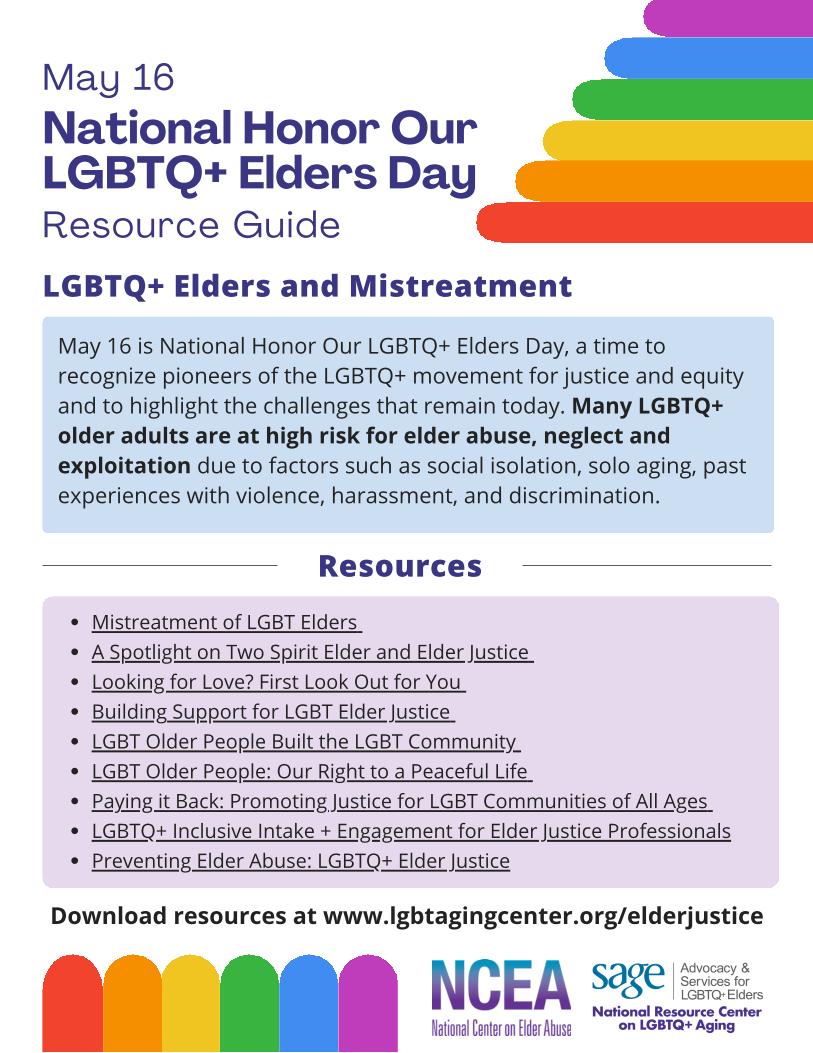
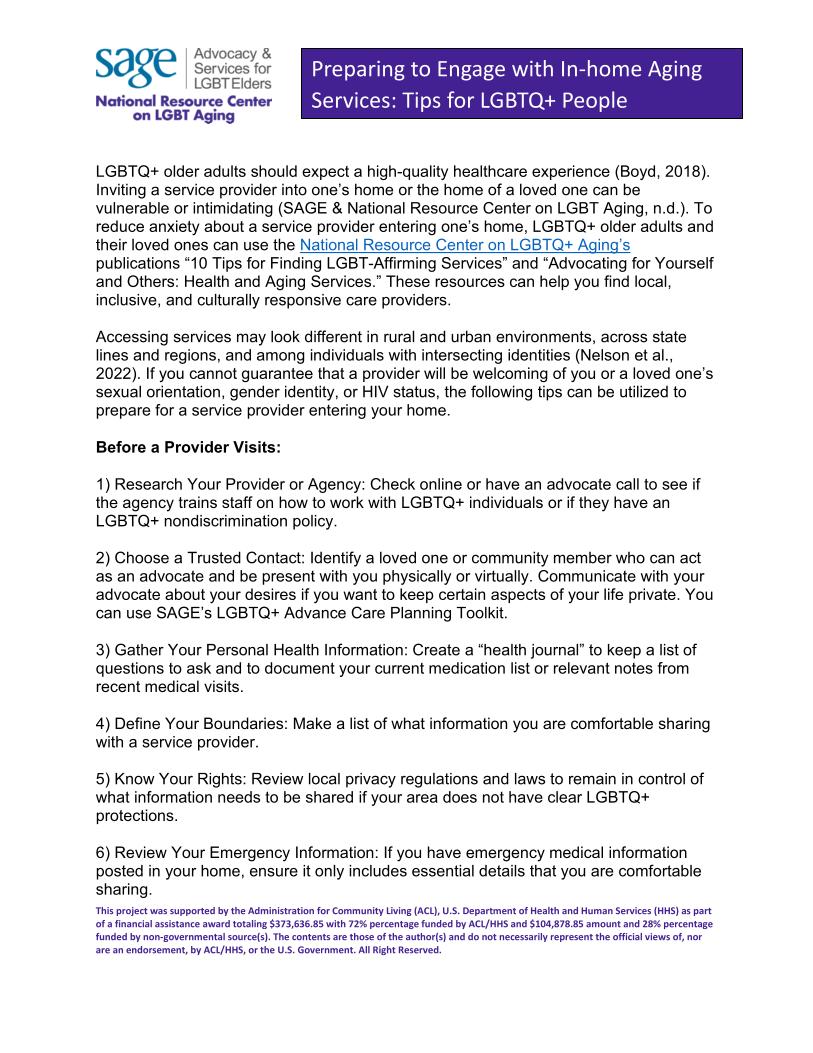

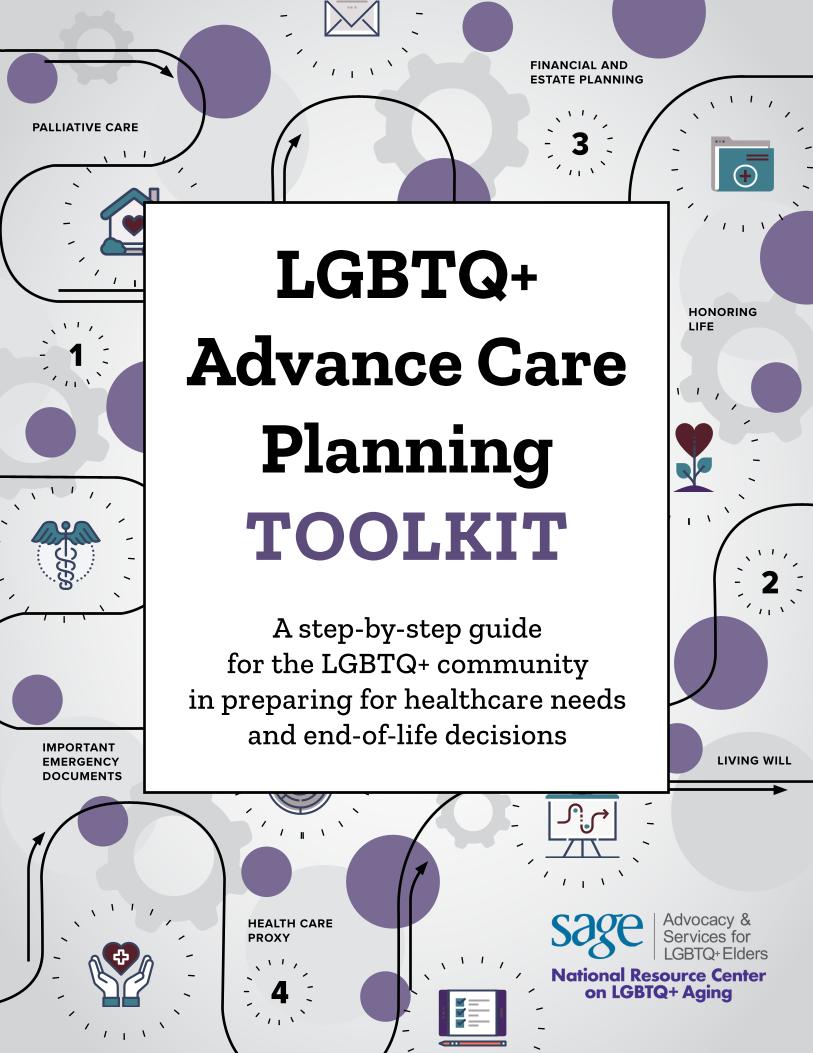
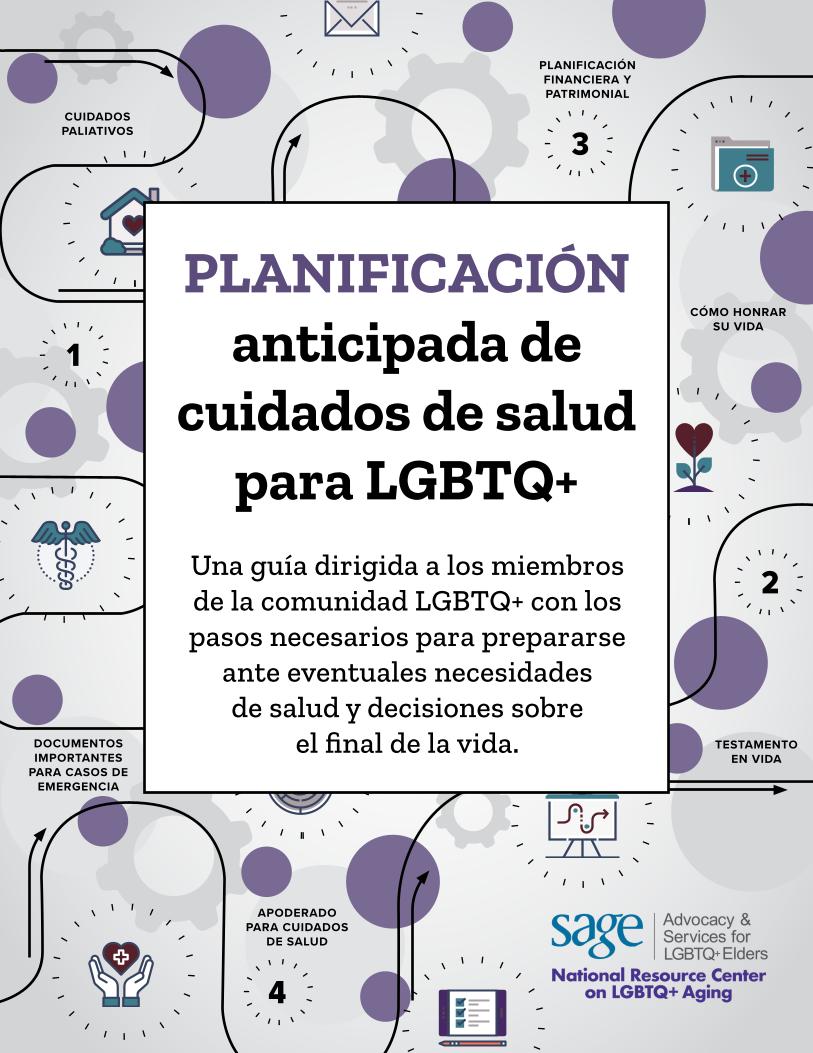
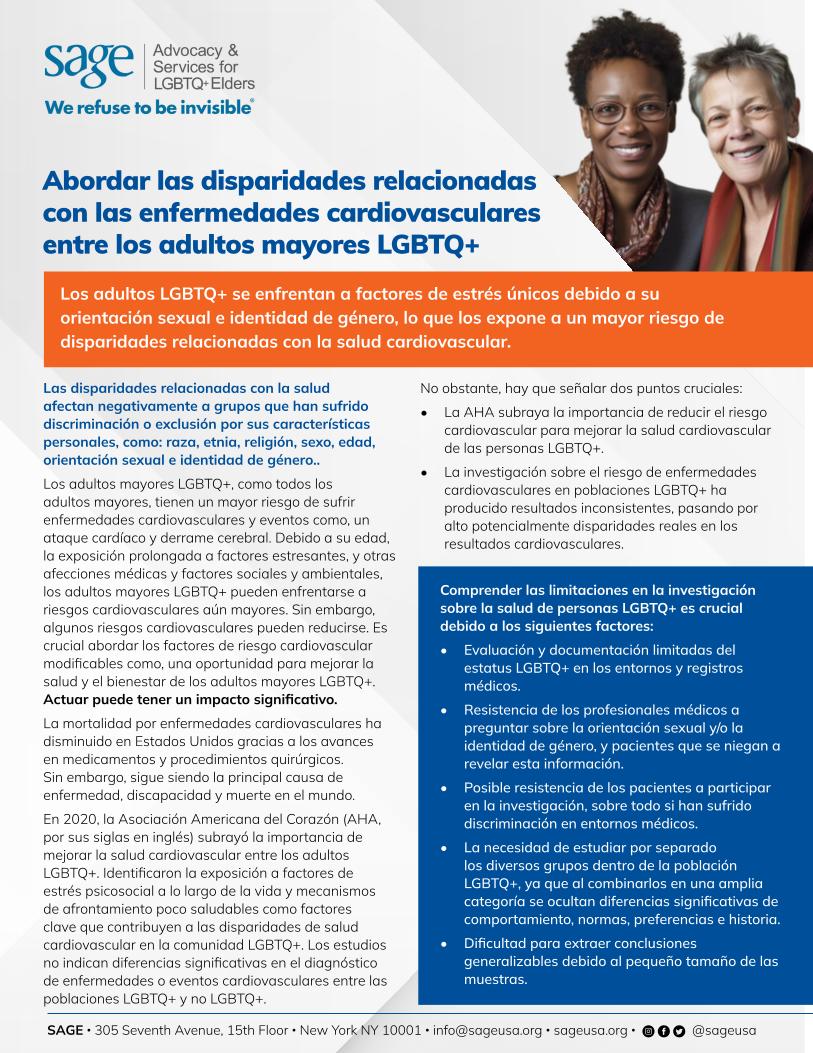
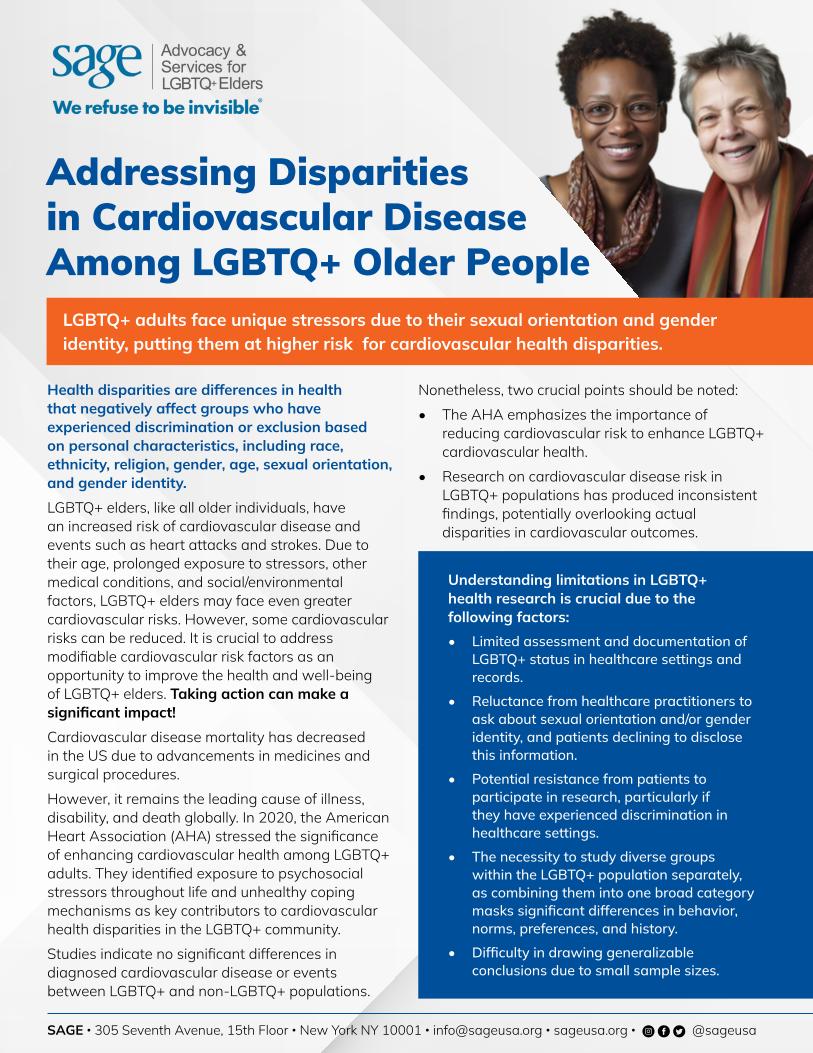
_page_1.jpg)

